Jan 2012
Jan 2012 sadminA qualifying seal of approval for new artisans
A qualifying seal of approval for new artisans sadmin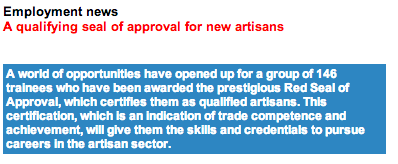
The graduates, who were part of the Gauteng Department of Infrastructure Development‘s Accelerated Artisan Training Programme, successfully completed their theoretical and practical technical training, including trade tests in trades such as boiler-making, welding, electrical and fitting and turning.
They will also sit for assessments on plumbing and motor mechanical trades in 2012.
Workplace training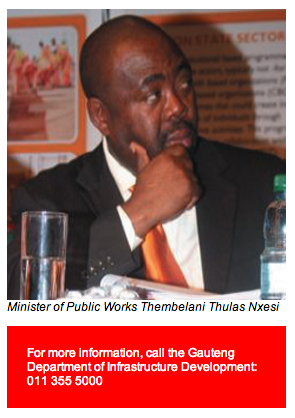
These young unemployed people were part of a group that went through a full 18-month programme that started in 2009. They were exposed to 56 days of workplace training after a 24-week theoretical training block presented by accredited training providers.
They were allowed a five-week period to prepare for two days of rigorous trade test exams.
Training providers included Fundi Training Centre, SAJ Competency Training Institute and Industry Education Training Institute.
Job opportunities
The Gauteng Department of Infrastructure Development (DID), as a lead department for projects in the Gauteng Expanded Public Works Programme, is implementing the Artisan Technical Training and Development Programme. It has a mandate to recruit, train and place artisans at Further Education and Training institutions for training purposes.
The programme further involves workplace exposure at institutions within the public and private sector to give beneficiaries access to on-the-job training.
The department also enters into liaison partnerships with participating institutions in both sectors for possible commitment to absorb the participants as they exit the programme. This has given graduates access to job opportunities in those sectors.
Essential maintenance
Plans are underway to place 86 of the newly qualified artisans in various DID regional offices to render essential maintenance to public infrastructure in the province. The 86 include 59 electricians, 17 fitters and turners, two welders and eight boilermakers.
The department is confident that the private sector will also absorb this new cadre of artisans by offering them job opportunities.
Agriculture rooting to grow
Agriculture rooting to grow sadmin
Agriculture, Forestry and Fisheries Minister Tina Joemat-Pettersson is upbeat her department can create about 90 000 jobs a year over the next ten years if provinces submit at least 140 project plans for job creation projects.
Joemat-Pettersson said the provinces’ plans could create 30 000 permanent and 60 000 temporary jobs per year – all part of the department’s provincial job creation projects. 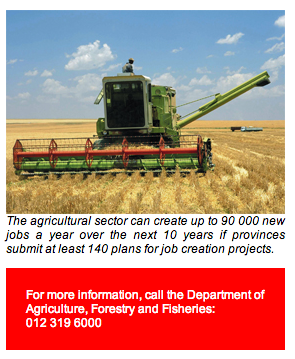
Statistics SA says the agricultural sector has been experiencing increasing job losses and employment has declined at an average of about 5 per cent per quarter – leaving a total of 598 000 jobs in agriculture by June. But, the Minister believes that by improving the competitiveness of the commercial sector and supporting smallholders to become commercially viable, South Africa might overcome the challenges of an increasingly concentrated sector and an increasingly competitive global market.
She points out that her department’s Smallholder Development Support Programme and the Zero Hunger Programme are longer term programmes, aimed at developing markets and comprehensive farmer support.
In products with a negative trade balance, such as processed agriculture, forestry and fisheries, Joemat-Pettersson says her department is hard at work devising an import substitution strategy. It aims to provide incentives that would encourage local processing of both agricultural and forestry products.
And in products with a positive trade balance, such as unprocessed agricultural products, which experienced a positive trade balance of R15,4 billion, they plan to diversify the market from South Africa’s current traditional markets to new dynamic markets
“This will be done through trade promotions and bilateral agreements. The strategy will further look at changing our export profile – changes in product lines going to traditional markets,” Joemat-Pettersson says.
Disability not the end of the road for Zulu
Disability not the end of the road for Zulu sadmin
In 1998, he became the director of KwaZulu-Natal’s Asiphephe (Let us be safe) Road Safety Project, a sub-directorate within the provincial Department of Transport. “Our task was to reduce the number of road crashes that have led to so many deaths and cases of disability,” he says.
Zulu took time out of this busy schedule of being a motivational speaker and being involved in road safety campaigns to speak to Vuk’uzenzele. The father of two daughters, Swazi (8) and Ziyanda (5),says the disability has changed his life in a sense that it’s difficult to never walk again.” Then he jokes: “The nice part is that my shoes never go old.”
He remembers the night of the accident clearly. “I was young and careless. I hit a wall as a result of speeding. Now I tell people never to speed. They should only speed in their minds.”
Life changed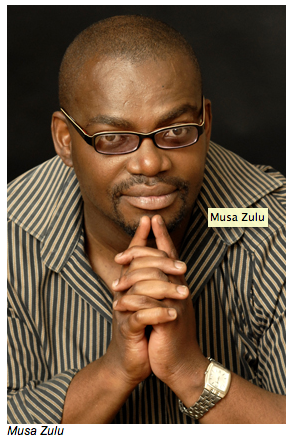
At the time of the accident, he was working for Tongaat Mushrooms as senior personnel manager. A week before the accident, his employer informed him that he was earmarked for a promotion at head office in Johannesburg. Things were going very well for him as he was also talking to his partner about getting married.
But then his whole life changed and things were very hard after the paralysis. He lost his job (early retirement) and his girlfriend of two-and-a-half years left him. “Suddenly, all was gone and tears formed a veil through which I viewed life. I did not want to believe that it happened to me.
“After a full year of pain and wishing for a miracle, I realised that my family and close friends were beginning to lose hope that I would ever find a reason to smile again. My sorrow was affecting them as well, especially my father. I pulled myself together and vowed never to bow to failure again.”
Zulu says that listening to music gave him strength. Seeing other disabled people striving to live full lives made him want to achieve the same.
Social science
Zulu has always had great enthusiasm and energy for life. In 1989 at the age of 17, he started his university studies in social science.
“I have always been attracted to community development initiatives and issues. Social science offered me the opportunity to study my society and understand its dynamics. My wish was to make a difference, particularly to the marginalised black population whose lives have been disrupted by years of political oppression,” says Zulu.
He left the university towards the end of 1994 to join Tongaat Mushrooms. During his brief stay there, he initiated many changes that uplifted workers. “I was paralysed shortly after completing the job descriptions of all employees – an exercise that saw many employees receiving improved salaries because of a well-defined job grading system. Then came the accident.”.
In 1998, he visited the State of Victoria in Australia to see how they dealt with road crashes. This was part of the Department of Transport’s research prior to launching its Road Safety Campaign. “Apparently the state has one of the lowest road death/crash records in the world,” he says. While there, he met people from various disability organisations to learn from them how they assisted their government to meet the needs of the disabled.
Zulu says: “Before the end of 1998, I was part of the Department of Transport’s team that launched the first buses for the disabled – fully equipped with hydraulic lifts to provide easy access. Three of these buses are in operation in KwaZulu-Natal.” He left the provincial Department of Transport and the Public Sector in 2002.
Happiness revisited
He has since joined forces with his disabled friends and formed a support group. “Happiness revisited me. I found myself wanting to win back my sense of independence and control.” He bought a car and started visiting newly disabled people in hospitals.
“While I was in hospital my father told me that everything happens for a purpose. I did not know what he meant then, but today I have found my purpose in life – to show the world that there is always a bright sky after a storm if we believe,” concludes Zulu, now 39 years old.
“I have found a ‘home’ in my situation of disability. There is nothing that I cannot do. I have grown and matured as a result of the accident. I am truly blessed. I don’t live with regrets and my advice to people is to love life and be safe.”
-Refilwe Thobega
Education: FET takes you further
Education: FET takes you further sadmin
One option might be to further your learning after school at a Further Education and Training (FET) college. 
If you decide to apply to a FET college, you can expect to gain both practical and theoretical knowledge, exposure to your chosen industry, as well as a meaningful qualification without paying the kind of money that will land you in student debt before the launch of your career.
The FET sector, with its 50 colleges and 263 campuses spread across South Africa’s rural and urban areas, is a major provider of skills-development training. The FET college system carries more than 200 000 students in public colleges and about 100 000 in private colleges.
What is FET?
The FET category of education and training is often referred to as post-school, that is, education and training that takes place after leaving school. You can study at FET level even if you have only completed Grade 9, but you must be serious about following an education and training programme with a view to acquiring marketable skills.
FET courses are vocational or occupational by nature, which means that the student receives education and training with a view to a specific range of jobs or employment possibilities. The only age restriction to study at the FET level is that you should be 16 years or older.
Public FET colleges are established and operated under the authority of the Further Education and Training Colleges Act and fall under the Department of Higher Education and Training.
Public FET colleges are subsidised by the State with approximately R4 billion per year. Each province has an office that provides specialised professional support to the public FET colleges in that province.
Courses
FET colleges offer a very diverse range of courses with some colleges offering up to 300 different courses. These include industry fields such as agriculture; arts and culture; business, commerce and management; education, training and development; engineering, manufacturing and technology; services; building construction and security.
The length of the course and the admission criteria differs depending on the nature of the course.
Bursaries
FET college bursaries from the Department of Higher Education and Training are administered by the National Student Financial Aid Scheme. If you want to apply for a bursary, you will be required to undergo a means test, which indicates whether you really need financial assistance. You must also have a good academic performance record.
If you believe this is the way forward for you, contact the public FET College where you plan to study. The college will provide the application forms and oversee the application process.
Education: Kha Ri Gude leads the way
Education: Kha Ri Gude leads the way sadmin
These learners are not matriculants or college graduates; they are adults aged between 18 and 80, some of them blind, deaf or physically disabled, who completed Kha Ri Gude literacy and numeracy courses in 2010.
They are part of a group of more than two million adults who had just stepped over the illiteracy threshold as they received their ABET level 1 (Grade 3 certificates) with pride and gratitude.
Education for all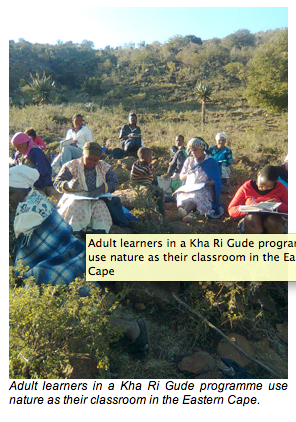
Globally and across the African continent, the past decade has seen an increase in the commitment to eradicate adult illiteracy. This is in line with the Education for All drive to halve illi-teracy by 2015.
The Kha Ri Gude mass literacy campaign is government’s attempt to fast-track literacy achievement and to meet the Education for All goal of teaching 4,7 million adults to read and do basic arithmetic.
Joyful graduation ceremonies are one of the outcomes of the campaign. Another positive outcome is that the campaign had an 80 per cent completion rate in 2008, which rose to 89 per cent in 2009 and 92 per cent in 2010. In each of these years, close to 80 per cent of those who wrote passed their learning assessments.
SAQA verification
On 10 June 2011, the South African Qualifications Authority (SAQA) released its report on the Kha Ri Gude assessment processes. SAQA is an official body which oversees the development of the National Qualification Framework (NQF). The NQF is the set of principles and guidelines by which records of learner achievement are registered to enable national recognition of acquired skills and knowledge, thereby ensuring an united system that encourages life-long learning.
SAQA’s verification of learner assessments is one of the necessary checks to ensure the reliability of the campaign and its processes.
During March 2010, SAQA drew a sample of assessments and, using a team of 210 moderators, checked a total of 44 848 learner assessments form the 546 000, which were completed by Kha Ri Gude learners in 2009.
Education: National Skills Accord
Education: National Skills Accord sadmin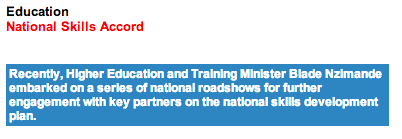
The roadshows follow the ground-breaking National Skills Accord which was signed by Minister Nzimande with representatives of organised business, labour and community-based structures in Pretoria last year.
The roadshows were aimed at discussing key aspects of the national programme for skills development and the widening of access to post-school education for the youth. One of the aims of the accord is to improve the role and performance of FET colleges.
Other aims are to: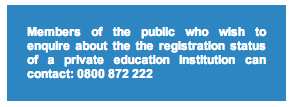
- improve Sector Education and Training Authority governance, financial management and stakeholder involvement
- align training to the New Growth Path and improve Sector Skills Plans
- expand the level of training using existing facilities more fully
- make internship and placement opportunities available within workplaces
- set guidelines of ratios of trainees to artisans and across technical vocations
- improve the funding of training and the use of funds available and incentives to companies to train
- have annual targets for training in state-owned enterprises.
Education: What is the Kha Ri Gude campaign?
Education: What is the Kha Ri Gude campaign? sadmin
In its first year, 357 195 learners were enrolled, with 613 643 in 2009 and a further 610 000 in 2010. In 2011, 658 000 learners have enrolled and South Africa is therefore well on its way to achieving its goal. 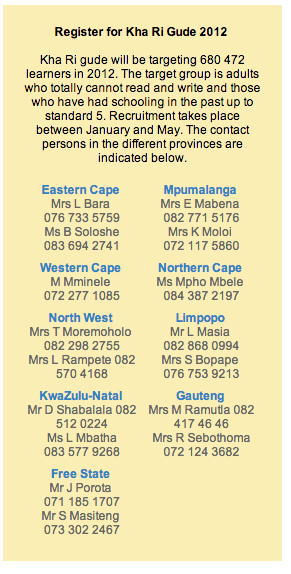
- The campaign enables learners to read, write and calculate in their mother tongue in line with the unit standards for ABET level 1/Grade 3, and also to learn spoken English.
- It relies on community participation: members of the community help with the recruitment of teachers and learners, with the selection of venues for classes, and with monitoring.
- Because it uses the services of volunteers, the campaign creates job opportunities. Over the past two years, the campaign has paid out R750 million to more than 70 000 volunteers, and a further 40 000 volunteers were active and earning a stipend in 2010.
- Emphasis is placed on making the lessons accessible, so classes are held at times and places that are convenient to the learners. It take place in homes, churches, mosques, schools, prisons and community centres.
- Learners do not pay for the classes, which makes it possible for the poorest members of the community to attend, but they must commit themselves to attending classes regularly for the duration of the academic year.
- Classes are offered in all 11 official languages, as well as in Braille and Sign Language.

FAIS Ombud to the rescue
FAIS Ombud to the rescue sadmin

An ombud is a person who investigates complaints and negotiates fair settlements, especially between persons that have been wronged, victimised or injured such as consumers or students and an institution or organisation.
Resolve disputes
Since 1 April 2005, the FAIS Ombud was granted the authority to deal with complaints against financial institutions, which do not fall within the authority of any other ombud scheme or where there is uncertainty over authority.
The FAIS Ombud’s role is to resolve disputes between financial services providers and their clients in a procedurally fair, informal, economical and quick manner. The FAIS Ombud‘s jurisdiction is limited to violations which occurred on or after 30 September 2004 and to claims not exceeding R800 000.
The FAIS Ombud deals with complaints submitted by a specific client against a financial services provider.
The FAIS Ombud’s services are free and accessible to all consumers.
Complaints
A “complaint” means a specific grievance relating to a financial service rendered by a financial services provider or a representative of such provider to the complainant.
The complaint will be considered if it is alleged that the provider or representative:
- has contravened or failed to comply with a provision of the FAIS Act and that as a result thereof the complainant has suffered or is likely to suffer financial prejudice or damage;
- has wilfully or negligently rendered a financial service to the complainant and has caused prejudice or damage to the complainant or which is likely to result in such prejudice or damage; or has treated the complainant unfairly.
“Client” means a specific person or group of persons, excluding the general public, who is or may become the subject to whom a financial service is rendered intentionally, or is the successor in title of such person or the beneficiary of such service.
Six-month period
Before submitting a complaint to the FAIS Ombud, you must try to resolve the complaint with the responding party. The responding party has six weeks in which to resolve the complaint. The complainant then has six months within which to submit a complaint to the FAIS Ombud.
The complaint must relate to a financial service rendered by a financial services provider or the representative of the provider.
“Financial services provider” means any person who as a regular feature of the business of such person or provides advice or provides a service as a go-between service.
The complaint must not relate to money which involves more than R800 000, unless the responding party has agreed in writing to this limitation being exceeded.
- Samona Murugan
Fingerprint technology fights fraud
Fingerprint technology fights fraud sadmin
The newly-launched Online Fingerprint Verification System is expected to deal a major blow to acts of fraud and corruption that have cheated banks out of millions of rands, said Home Affairs Minister Nkosazana Dlamini Zuma.
The system is a joint initiative between the Department of Home Affairs and the South African Banking Risk Information Centre (SABRIC).
Five banks - ABSA, African Bank, FNB, Nedbank and Standard Bank - are currently participating in the initiative. The system is at different phases of implementation with each bank.
It will allow banks access to the Home Affairs National Identification System to verify the identity of prospective and current clients by using their fingerprints.
Partnership
The partnership between the department and the banking sector will contribute to people feeling safer in the knowledge that their savings, investments, deposits and hard-won earnings are secure in the hands of the various banking institutions, Minister Dlamini Zuma said.
SABRIC described the initiative as an important step towards helping banks prevent crimes related to identity theft in the banking sector.
“Bank clients will benefit immensely from this initiative as it offers the banks a second layer of confirmation that the persons presenting identity documents are indeed who they purport to be,” said SABRIC CEO Kalyani Pillay.
Game, set, match for Sithole
Game, set, match for Sithole sadmin
His achievements, despite his disability, have turned South Africa’s top wheelchair tennis player and champion Lucas Sithole, into a formidable role model for many young people. And, despite being ranked among the top 20 in the world, this tennis ace remains modest and humble.
Last year, the Newcastle, KwaZulu-Natal-born wheelchair tennis player made history when he won the Melbourne Open Championships, competing against the world’s strongest wheelchair tennis players in the quad division.
Inspiration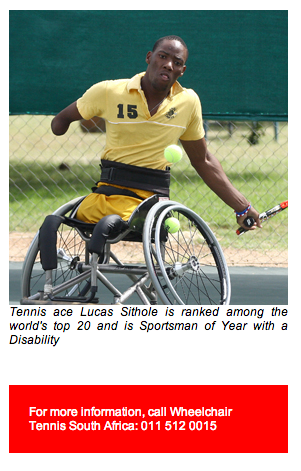
An inspiring quadriplegic, Sithole is Wheelchair Tennis South Africa’s number one-ranked player and is ranked number 16 in the world. Sithole won the Sportsman of the Year Award in the Sportsman of the Year with a Disability category at the 2011 South Africa Sports Awards held at Sun City.
He also won the Disabled Sportsman of the Year Award at the inaugural Gauteng Sport Awards. Sithole described his winning the award as a great source of inspiration for him to qualify for this year’s London Paralympics.
The 25-year-old wheelchair tennis champ is now based in Gauteng and is studying at the University of Johannesburg. He is also a member of the university’s Performance Excellence Centre. Sithole was involved in a tragic train accident that left him a triple amputee at the tender age of 10.
Honour
“It was such an honour for me to receive those two awards and it felt so good to be recognised alongside such great athletes,” Sithole said.
“We’re exceptionally proud of his performance and his determination is undoubtedly his edge,” said Wheelchair Tennis South Africa director Holger Losch. He added that Sithole possessed the perfect mind and body for tennis. “Lucas is light and agile on the court with the ability to use his strengths to his advantage. He always plays to win.”
Sithole has been through great adversity in his life and is a role model for many other athletes. According to Sithole, his attitude and approach to life has brought him this far and he has no doubt that these attributes will take him a great deal further both personally and professionally. The wheelchair tennis champion is definitely worth watching out for as South Africa prepares to compete in the 2012 Paralympic Games in London.
-Mbulelo Baloyi
Gauteng takes action to reach job targets
Gauteng takes action to reach job targets sadmin
Towards the end of 2011, a total of 140 868 jobs were created across the 12 Action Plans, said Premier Nomvula Mokonyane.
The Gauteng Provincial Government reported that of these jobs, 3 668 were permanent against the annual target of 26 140, while 33 064 were temporary jobs against the annual target of 58 001 and 104 136 were from the Expanded Public Works Programme against the annual target of 143 380.
“Our commitment to the promise of decent employment through economic growth is still as strong as ever,” she said, adding that 464 people were trained in sector skills. These included the following projects: Ford T6, Ford Incubator, Talent Pipeline, Taxi LPG, Bodyshop mentorship, and Tirisano.
In addition, the provincial government continues to support small, medium, and macro enterprises.
Five micro-finance loans were approved in the second quarter. Additionally, seven co-operatives were assisted with financial support and non-financial support was provided to 282 already existing cooperatives.
-BuaNews
Great strides in evaluating government's performance
Great strides in evaluating government's performance sadmin
It focuses on 12 priority performance outcomes, which form the basis for performance and delivery agreements between ministers or groups of ministers and the president. They are:
- Improved quality of basic education.
- A long and healthy life for all South Africans.
- Safety for all people in South Africa.
- Decent employment through inclusive economic growth.
- A skilled and capable workforce to support an inclusive growth path.
- An efficient, competitive and responsive economic infrastructure network.
- Vibrant, equitable and sustainable rural communities with food security for all.
- Sustainable human settlements and improved quality of household life.
- A responsive, accountable, effective and efficient local government system.
- Environmental assets and natural resources that are well protected and continually enhanced.
- Creating a better South Africa and contributing to a better and safer Africa and World.
- An efficient, effective and development-orientated public service and an empowered, fair and inclusive citizenship.
Great progress
Since the establishment of M&E, great progress has been recorded, with plans for the 12 priority outcomes developed, and quarterly monitoring reports on these outcomes provided to Cabinet. These reports allow the President and Cabinet the opportunity to assess progress and introduce interventions where necessary.
Other areas developed have been systems for the monitoring of front-line services, and for assessing the management performance of government departments.
The latest element to be developed in the M&E toolkit is the evaluation component of the system. The National Evaluation Policy Framework has been drafted by a group of stakeholders coordinated by the Department of Performance Monitoring and Evaluation (DPME) and approved by Cabinet on 23 November 2011.
The framework draws from the experience of a number of countries, and in particular from a study tour to Mexico, Colombia and South America undertaken in June/July 2011. Some of the key lessons to emerge from this study tour are the:
- need for a system with standardised components
- importance to link to the planning system (as you are evaluating against plans)
- need for a common language around evaluation
- need for a champion with technical expertise to drive the system
- need for a suite of types of evaluations
- need for evaluations to be independent and credible
- need to ensure follow-up, so that the results of the evaluations are used.
Why is evaluation important?
Evaluations provide assessments that are based on evidence of the relevance and performance of programmes, policies or plans. This can inform ongoing implementation, as well as planning and budgeting processes.
Evaluations also serve to strengthen accountability by providing reliable information on progress in the achievement of public objectives to stakeholders, often identifying the key factors driving success or failure.
For example, in applying its evaluation system across government, Chile found that 51 per cent of programmes needed substantial revision. Failure to identify and address such problems will result in reduced implementation and effectiveness.
Evaluation is currently applied sporadically in government and is not informing planning, policy-making and budgeting sufficiently, so we are missing the opportunity to learn from experience to improve government’s effectiveness, efficiency and impact.
What approach are we taking?
We are undertaking evaluation for four reasons:
- to improve performance
- to improve accountability
- to improve decision-making and
- to increase knowledge about the area.
One of the main things learned from the study tour was that evaluation should not only be seen as something which happens at the end of an intervention, but as a series of activities at different stages of our management cycle, starting before a policy or programme is designed.
These different types of evaluation should be undertaken at different stages of an intervention and provinces and departments will be expected to produce their own annual and three-year evaluation plans.
Nationally, an annual and three-year evaluation plan will be produced, focusing in particular on large, strategic or innovative programmes. Departments will undertake these with support from the DPME.
Improvement plan
The evaluations in the national evaluation plan will be a partnership between the department and the DPME, led by the respective department. Following each evaluation, an improvement plan will be developed drawing from the recommendations of the evaluation, which will be monitored.
The reports of the evaluations will be made available to the public, posted on the department’s website and also the DPME’s website.
-Harold Maloka, Ministry for Performance Monitoring and Evaluation in The Presidency
Health: Be aware – malaria can kill
Health: Be aware – malaria can kill sadmin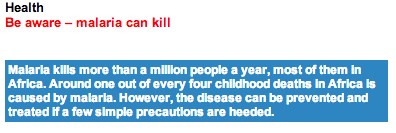
Enoch Khensani*, a 42-year-old member of the Government Employees Medical Fund, recently fell ill. Enoch, who works at the Department of Public Works in Johannesburg, returned from a visit to his hometown in Maputaland in northern KwaZulu-Natal, after a long break of two years.
Two weeks after returning to Johannesburg Enoch fell ill with what he was sure was flu. His symptoms included fever, chills, headache, body aches, joint pains, coughing and diarrhoea.
But Enoch had caught something potentially far more serious than flu. His doctor suspected this and had him tested for malaria. To Enoch’s surprise, he tested positive for malaria. Even though he had lived in northern KwaZulu-Natal, a malaria area, through his childhood he had never had malaria. His doctor explained that people who lived in malaria areas often develop a semi-immunity to it. However, they lose this immunity after living in non-malaria areas such as Gauteng for a year or more.
Visit your doctor
Enoch made a complete recovery after treatment. He was wise to insist on getting medical help because malaria can cause serious complications if left untreated.
If you do develop any signs of the disease after visiting a malaria area visit your doctor immediately. It could save your life.
As in Enoch’s case, the early symptoms are often flu-like and it is commonly confused with flu by both patients and doctors. Malaria can develop as early as seven days after entering a malaria area and for up to six months after leaving.
Malaria areas
Malaria is spread through the bite of a mosquito called the Anopheles mosquito.
It is quite common in southern Africa where it is found in northern KwaZulu-Natal and Limpopo, as well as in the eastern areas of Mpumalanga and in Swaziland, Mozambique, Zimbabwe, Botswana, Namibia, Angola and Zambia. It also occurs in most other African countries including Uganda, Kenya, Ivory Coast, Ethiopia and Ghana.
Nobody is immune to malaria, so whether you travel for business or leisure to these areas you are always at risk.
Protect yourself
There are a number of ways to protect yourself, including through the use of preventative medication.
While this will usually prevent you from getting malaria or help to reduce the severity of the symptoms, no medication offers complete protection. It is vitally important to continue taking your medication as your doctor instructs you. Some medications require that you continue to take them for a couple of weeks after your visit to a malaria area. This should be done even if you think mosquitoes did not bite you during your stay.
One of the best ways to prevent malaria, is to make sure that mosquitoes do not bite you.
Preventative measures:
- wearing long-sleeved clothing and long trousers from dusk until dawn when you are outside
- putting on mosquito repellent lotions or sprays
- using mosquito coils, electric air repellents and insecticidal sprays to kill or chase off the insects
- sleeping under mosquito nets
- staying in places that have mosquito screening on doors and windows.
-Source: Government Employees Medical Scheme (GEMS)
Health: Eye-care centre a vision for success
Health: Eye-care centre a vision for success sadmin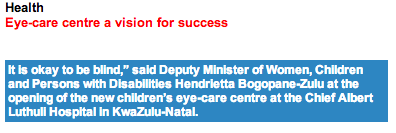
It was an assurance from the heart, as the Deputy Minister is herself visually impaired and has two of three daughters who are similarly challenged.
“People like me today stand as a testimony that blindness and success can go together,” she said.
Minister Bogopane-Zulu was the guest of honour and a keynote speaker at the official opening of the children’s eye-care centre, along with MEC for Health in KwaZulu-Natal Dr Sibongiseni Dhlomo.
The project was a joint effort between government and the private sector to “save the sight of children and prevent blindness”. Other partners involved were the International Agency for the Prevention of Blindness and ORBIS, the international non-profit non-governmental organisation dedicated to saving sight worldwide.
Mentorship
According to Deputy Minister Bogopane-Zulu, it is estimated that there are 1,24 million blind children in the world with 90 per cent in developing countries. Africa alone accounts for
320 000 while in South Africa, the province of KwaZulu-Natal is home to about 2 000 blind children.
In the past, blindness was often a result of poverty manifested through a lack of universal access to health resources, particularly preventative healthcare. Some blindness among children, if detected early and treated, can be prevented, leading to fewer blind adults, the Minister said.
She stressed that it was important to groom the personalities of the disabled children and help identify their skills path early in their lives.
Given the variety of causes for visual impairment, the impact of HIV on this condition should not be neglected.
Highly specialised
The new centre at Chief Albert Luthuli Hospital is the only one of its kind in the province and the second in the country, and will work through a system of referrals.
Dr Dhlomo said: “This centre is highly specialised and other institutions will refer their patients to this facility. As a province, we have taken a decision to create specialist posts including ophthalmology and paediatrics at various hospitals in the province to entrench a notion of healthcare accessibility.”
Public-private partnerships in health is a growing phenomenon and the International Agency for the Prevention of Blindness (IAPB) is already active in many African countries including Ghana, Cameroon, Angola and Burkina Faso where paediatric centres had been opened. Together, with ORBIS, IAPB aims to open 10 more centres in Africa in the next 10 years.
Health: New all-inclusive HIV and AIDS plan
Health: New all-inclusive HIV and AIDS plan sadmin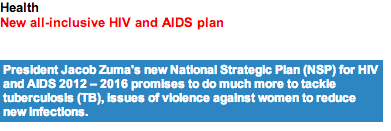
The strategic plan proposes to deal with HIV, sexually transmitted infections and tuberculosis by adopting an all-inclusive approach which includes preventative and therapeutic measures. 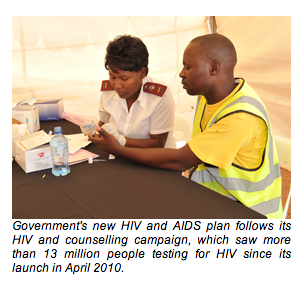
President Zuma launched the plan on World Aids Day, December 1st at the Wolfson Stadium in KwaZakhele in the Eastern Cape.
Aims
The new strategy, which will be implemented from April, aims to:
- reduce new HIV infections by at least 50 per cent by using a combination of preventative measures
- start at least 80 per cent of patients on antiretroviral treatment with 70 per cent being alive and on treatment five years after they started
- reduce the number of new TB infections as well as deaths from TB by 50 per cent
- ensure an accessible legal framework that protects and promotes human rights in order to support the implementation of the strategic plan, and reduce stigma related to HIV and TB by at least 50 per cent.
The strategy will also address barriers that prevent the treatment of HIV, sexually transmitted diseases and TB and will increase the protection of human rights and improve access to justice.
Four zeros
President Zuma said the country had also adopted the “three zeros” agreed to at the United Nations high level meeting in New York this June as a vision for the next 20 years.
South Africa has added a fourth zero, which aims to eliminate HIV transmission from mother to child. The four zeros are:
- zero new HIV and TB infections
- zero new infections due to mother to child transmission
- zero preventable deaths associated with HIV and TB
- zero discrimination associated with HIV and TB.
President Zuma said government had learnt a lot from the previous plan and it now understood which methods worked and which did not.
Significant progress had been made in all areas of the previous plan. After launching the national HIV counselling and testing campaign in April 2010, more than 13 million people were tested for HIV and more than eight million were screened for TB.
Between January 2010 and September 2011, the number of public health facilities starting patients on antiretroviral treatment increased from 495 to 2 948 and the number of nurses
accredited to initiate and provide treatment had increased from 290 a few years ago to 10 542.
Violence against women
The President was pleased that the issue of violence against women was reflected in the new NSP. Recent research in South Africa showed that HIV infections in young women could be prevented if they were not subjected to violence or intimidation by their partners.
“Government is prioritising the fight against the abuse of women and children through law enforcement, as well as education and awareness. We must also enhance our socio-economic interventions to deal with poverty, unemployment, food insecurity and inequality... these either contribute to the spread of HIV or worsen impact of the epidemic,” said President Zuma.
Walk the talk
Welcoming the launch of the new plan, Prudence Mabela, who has been living with HIV for 22 years, said everyone had to walk the talk when it came to implementing the plan.
She urged other infected people to take treatment and those who have not tested to find out their status.
“You can trust the public hospitals, I’m using them and they are helping... With the treatment you can live longer. I’ve taken TB treatment for six months and it’s effective, including the ARVs,” said Mabela.
-Gabi Khumalo
Internship opportunities for 2012
Internship opportunities for 2012 sadmin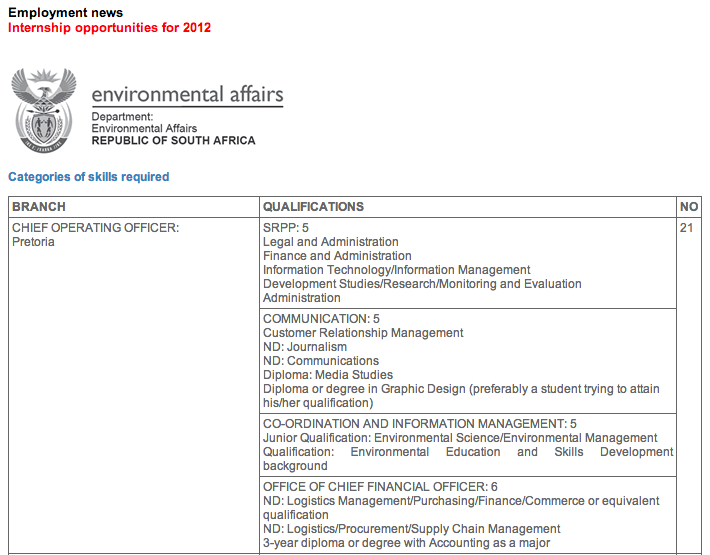
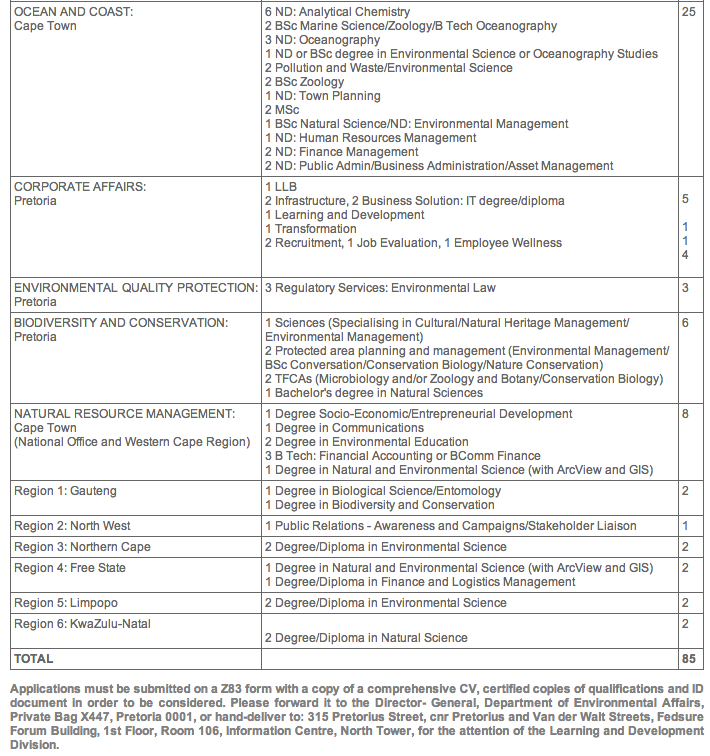
The National Department of Environmental Affairs is an equal opportunity, affirmative action employer. It is the applicant's responsibility to have their foreign qualifications evaluated by the South African Qualifications Authority (SAQA). Correspondence will be limited to successful candidates only. If you have not been contacted within three months after the closing date of this advertisement, please accept that your application was unsuccessful. The Department reserves the right not to make an appointment.
Closing date
13 January 2012
Enquiries contact
Joshua Moepya, tel. (012) 310 3763
Maria Tjiana, tel. (012) 310 3052
Phindhani Maphete, tel. (012) 310-3288
For more information, please visit our website at www.environment.gov.za
Call Centre: 086 111 2468.
Internship programme for the financial year 2012/2013
Internship programme for the financial year 2012/2013 sadmin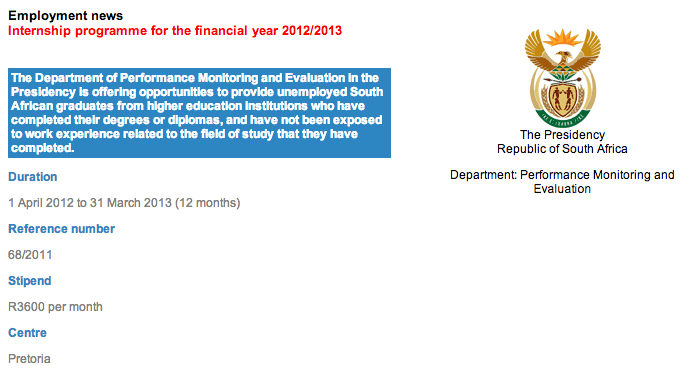
Requirements
Applicants must have satisfied the academic requirements for the advertised fields of study and must be new to the Public Service, i.e.: they should have not served as Public Service interns previously.
Applications are invited from candidates in the following Fields of Study: Financial Management, Public Administration, Public Management, Political studies, Economics, Accounting, Information Technology, Computer Science, Web Design and Geo Information system.
Enquiries
Ms Bonisile Molefe (012) 308 1870/ 1798
The Department of Performance Monitoring & Evaluation (DPME) is an Equal Opportunity, Affirmative Action employer. It is our intention to promote representivity (Race, Gender and Disability). Applications must be submitted on a Z83 form, obtainable from any Public Service Department, stating the field to which the intern is applying for, a CV, certified copies of certificates and Identity document copy and transcripts. Failure to submit required documents will result in the application not being considered.
Please forward applications, quoting the relevant reference number, to: The Department of Performance Monitoring and Evaluation in the Presidency, Private Bag X944, Pretoria, 0001 OR hand deliver at the Main Entrance, Union Buildings, Government Avenue, Pretoria, for Attention: Ms 8 Molefe. No faxed ore-mailed applications will be considered.
Closing date
31 January 2012 @ 16:30
Job interviews – Put your best foot forward
Job interviews – Put your best foot forward sadmin
Making a good impression during a job interview is one of the most important steps towards getting the job you deserve. So take some time to prepare yourself well. Being well prepared will also help you to feel confident during an interview.
How to prepare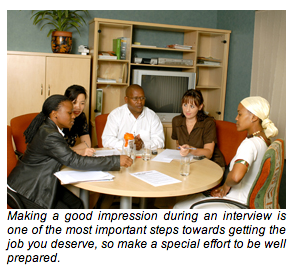
- Make sure you know exactly where the interview will take place and at what time.
- Find out how long it will take to get there and make sure you have transport that will get you there on time.
- Find out as much as you can about the company and the division where you will be working.
- Make sure you know what is involved in the job you’re applying for.
- Be ready to answer questions about what you have written in your curriculum vitae (CV) including your qualifications, skills and experience.
- Prepare some questions you would like to ask about the job.
- Decide what clothes you want to wear a day or two ahead of the interview and make sure it is neat and clean. Look professional without being too fancy. Don’t wear clothes that are too tight, too small or uncomfortable.
- Take an extra copy of your CV.
Things not to do
- Never be late for an interview.
- Don’t smoke, eat, drink or chew gum.
- Never lie about your abilities.
- Don’t talk about your personal or money problems.
Possible questions
You can never be sure which questions will be asked, but you can prepare answers to the ones that often come up in interviews. They include:
- Why do you think you are the right person for the job?
- What contribution can you make to the company/organisation?
- Tell us about yourself.
- What are your strong points?
- What are your weaknesses?
- How will you deal with difficult co-workers or situations?
- Where do you want to be five years from now?
- What salary are you seeking?
Making a good impression
It is normal to be nervous when you go for an interview, but try to relax, take a deep breath and believe in yourself. You have only one chance to make a good impression, so remember the following:
- Arrive on time, or better still, about 10 minutes early.
- Look confident, smile and give a firm handshake.
- Sit up straight, make eye contact and speak clearly.
- Look interested, alert and keen at all times.
- Answer all questions as honestly and as well as you can, but don’t say more than is necessary.
- Talk about your strong points, but don’t boast.
- If you don’t understand a question, ask for an explanation.
- Make sure your cell phone is switched off.
Remember, if you don’t get the job, you are not a failure. Never give up, try your best – you will eventually succeed.
-Louise van Niekerk
Letters to the Editor
Letters to the Editor sadmin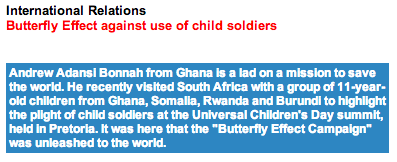
Andrew is no ordinary 11-year-old schoolboy. While boys his age are thinking about playing with their mates after school, he’s busy thinking about how he can save the world.
This feisty Ghanaian lad has many notches under his belt. Of significant note, he launched a global campaign called “Save Somali Children from Hunger”. His plan with the campaign? Andrew wished to raise $13 million to provide food, medicine, clothes and education to the children of Somalia.
He has been so instrumental in issues affecting young children, that after watching television images of the ravages of war and famine and the havoc it wreaks, Andrew vowed to work towards advancing global efforts to bring the horrific plight of girl-soldiers to an end.
Being appointed as Goodwill Ambassador for Girl Soldier Eradication in Africa, Andrew and 20 other children from Africa made their way to the The Universal Children’s Day summit.
Butterfly Effect Campaign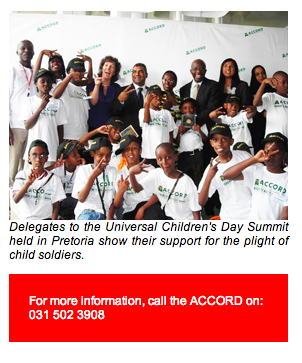
Hosted by the Durban-based African Centre for the Constructive Resolution of Disputes (ACCORD), in partnership with the Office of the Resident Coordinator of the United Nations in South Africa, the International Conference on the Great Lakes Region and the Royal Norwegian Embassy in Pretoria, the summit’s focus was on girl-child soldiers used in armed conflict on the continent.
At the event, ACCORD launched the “Butterfly Effect Campaign”, to mobilise young people all around the world to campaign for the eradication of the use of child soldiers.
The campaign’s goal is to create millions of child “butterfly” ambassadors across the globe - who will just like butterflies flutter into the world to campaign for the eradication of the use of child soldiers.
At least 300 000 children are taught to carry and operate rifles and are actively fighting in at least 30 countries across the world, with at least two-thirds in Africa.
They are recruited and are subjected to drugs, brainwashing, coaching and abuse. Forty per cent of child soldiers are girls who are also sexually exploited.
In the past decade, around two million children have been killed in armed conflict, three times as many have been seriously injured or permanently disabled, and countless others have been forced to witness or even to take part in horrifying acts of violence.
During the summit, Andrew pledged that he was ready to work to realise the goals of the “Butterfly Effect Campaign” promising new hope for African children.
“It is not a good thing for kids to murder, they should be in school. Parents must take care of their kids and make sure they’re not used in war,” he says passionately.
Child ambassadors
According to the campaign’s Trisha Pillay: “The plight is on girl-child soldiers, because they are exploited most. .”
And who better to pledge her support for the campaign other than the wife of former President Nelson Mandela, Graca Machel.
“Children are not the cause of wars. Grown-ups cause wars. There is no place for children in war zones, ” she said.
“Despite some progress achieved in the global campaign to end the recruitment and use of child soldiers, large numbers of children continue to be exploited in war and placed in the line of fire. Removing child soldiers from the battlefront is of fundamental importance to humanity.”
Protect our children
She urged all nations to make it their common duty to protect children, and more especially girls, from the theatre of warfare, in which they have no place.
“I have spoken to a child who was raped by soldiers when she was just nine-years old. I have witnessed the anguish of a mother who saw her children blown to pieces by land-mines in their fields, just when she believed they had made it home safely after the war. I have listened to children forced to watch while their families were brutally slaughtered.” Machel said.
“ I have heard the bitter remorse of 15-year-old ex-soldiers mourning their lost childhood and innocence, and I have been chilled listening to children who have been so manipulated by adults and so corrupted by their experiences of conflict that they could not recognize the evil of which they had been a part.”
As the campaign’s butterflies flutter out into the world to put an end to children used in armed conflict, Andrew remains confident that one day the world will be a better and safer place for Africa’s children.
Looking at the State of the Nation
Looking at the State of the Nation sadmin
The State of the Nation Address, (SoNA), is part of the opening of Parliament and is a key event on South Africa’s Parliamentary and political calendar. It is delivered to a joint sitting of Parliament’s National Assembly and National Council of Provinces.
The President addresses the nation in his capacity as Head of State, not only as Head of Government.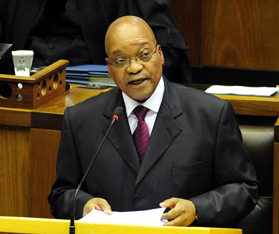
SoNA is an opportunity for the President to take stock of the country’s domestic and foreign situation and to chart a common direction that we should take to enhance and advance our efforts to achieve a better life for all.
During his speech, the President talks about government’s achievements of the past year and looks to the future by presenting a programme for the coming year, called the Programme of Action (PoA). The PoA sets out government’s plans to address various key government programmes.
SoNA is an annual ceremony of state at which the three arms of the state the Executive, the Judiciary and the Legislature (Parliament) - come together in one place.
Matric results and supplementary exams
Matric results and supplementary exams sadminEmployment news
Matric results and supplementary exams
Release of results and counseling support
The 2011 National Senior Certificate (NSC) examination results will be released at the different schools at 8:00 on 5 January 2012. Principals of schools will collect results from the district offices and give them out to learners at 8:00. Plans have been put in place for principals and teachers to offer counselling to those learners that may need such support. The Department of Basic Education and provincial education departments will have their call centres operational on 5 January 2012. Attached to the call centres will be a counseling service for candidates that may be traumatised by the outcome of the results.
Re-marking and re-checking of examination answer scripts
Candidates may apply for re-marking or re-checking of examination answer scripts immediately after receiving their results. The closing date for application for a re-mark or re-check is Monday, 23 January 2012. Late applications will be accepted until 27 January 2012. Application forms for re-marking or re-checking of examination answer scripts are available from schools or centres where the candidates sat for the examination. There will be cost implications for re-marking and re-checking, except for candidates from no-fee schools who will be exempt from payment of re-marking and re-checking fees.
Supplementary examinations
The following categories of candidates qualify for a supplementary examination:
- candidates that have not met the minimum promotion and certification requirements but require a maximum of two subjects to obtain the NSC
- candidates who could not sit or finish the examination due to medical reasons, a death in the immediate family or other special reason, provided documentary evidence is submitted
- candidates who do not satisfy the minimum higher education, higher education faculty requirements or the requirements for the specific occupation, provided documentary evidence is submitted.
Candidates who qualify for a supplementary examination can register at the centres where they sat for the examination immediately after receiving their results. The closing date for application for the supplementary examination is Tuesday, 24 January 2012.
Senior certficate examinations
The Department of Basic Education has extended the conduct of the Senior Certificate examination until May/June 2014 and has also relaxed registration requirements. Adult candidates who are 21 years or older and who have never registered for the Senior Certificate before, are now allowed to register for the Senior Certificate Examination if they undertake to complete the Senior Certificate in the next two to three years and they provide a motivation to the Head of Department why they should be allowed to register.
Meet Minister Angie Motshekga
Meet Minister Angie Motshekga sadmin
Her qualifications include a Higher National Diploma in Education, a Bachelor of Arts in Education from the University of the North, a Bachelor of Educational Science from the University of the Witwatersrand and a Masters Degree 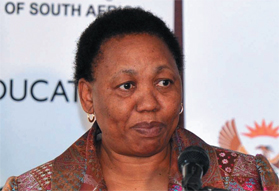 from the same university.
from the same university.
Minister Motshekga started off her career in education as a teacher at Orlando High School in 1981. In 1983, she was appointed as a lecturer at the Soweto College of Education and in 1985 she moved on to join the University of the Witwatersrand in.
In 1994, she became Director in the Office of the President; a position she held until 1997. From 1997 to 2007, Minister Motshekga was Deputy Secretary of the African National Congress (ANC) Womens’ League and since 2001 she has been the Deputy Chairperson of the ANC in Gauteng.
A member of the ANC National Executive Committee, and a President of the ANC Women’s League since 2007, Minister Motshekga has been a member of the Gauteng Provincial Legislature since 1999.
She is executive member of the National Education Union of South Africa and a member of the Sediba sa Basadi Trust. She was a member of the Gauteng Executive Council for Social Services and Population Development from 2000 to 2004 and a member of the Gauteng Executive Council for Education since 2004.
More jobs in non-agricultural sector
More jobs in non-agricultural sector sadmin
“The survey shows that the number of people employed in the formal non-agricultural sector of the South African economy increased by about 59 000 persons (+0,7%) from June 2011 (an estimated 8 300 000 employees) to September 2011 (an estimated 8 359 000 employees),” said Stats SA in its Quarterly Employment Statistics survey.
Employment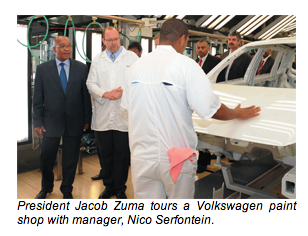
The survey is a quarterly survey covering a number of private and public enterprises in the formal non-agricultural sector of the South African economy. The information received is used to estimate employment and gross earnings that are used as inputs to the Gross Domestic Product (GDP) among others.
Between the quarters ended June 2011 and September 2011, gross earnings paid to employees in the formal non-agricultural sector increased. Gross earnings paid to employees during the quarter ended September 2011 amounted to R339 951 million. “This reflects a quarterly increase of R16 305 million compared with the quarter ended June 2011,” said the report.
Gross earnings
Gross earnings paid to employees in the formal non-agricultural sector increased between the quarters ended September 2010 and September 2011.
“The gross earnings paid to employees during the quarter ended September 2011 amounted to R339 951 million. This reflects an annual increase of R34 742 million compared with the quarter ended September 2010.”
In 2010, Finance Minister Pravin Gordhan said South Africa’s GDP needed a growth of 7% in order to transform the economy.
Job growth
Standard Bank said in a research note that the data was good news for job growth.
“However, some sectors are still battling to normalise their workforce in the face of challenging economic times. In addition, the labour market’s lagging indicator characteristics suggest that a meaningful revival in the market is still some way off,” it said.
Standard Bank said while the Reserve Bank is likely to keep its current monetary policy in 2012 there is credible argument for further rate cuts since third quarter GDP figures “confirmed the significant drop in economic momentum from the second quarter.”
In the third quarter, South Africa’s GDP came in lower than expected, increasing by 1,4%.
-BuaNews
More workbooks for better learning
More workbooks for better learning sadmin
Workbooks for learners were introduced by Minister Angie Motshekga in 2011 to provide organised work in the form of worksheets for every child in mathematics and language.
The aim of the workbook programme is to provide every child with two books of worksheets – one for numeracy/mathematics and one for literacy/language in the child’s mother tongue. Each book contains 128 worksheets – one a day for four days of the week.
“Research points to a clear correlation between learner achievement and the richness of teaching and learning materials and resources,” said Minister Motshekga. “This is why we have prioritised workbooks for learners”.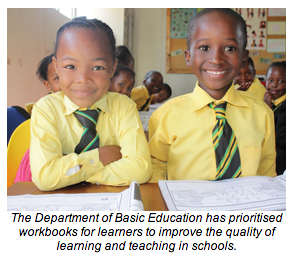
To increase the impact of the workbooks, the Department of Basic Education will expand the programme this year. In 2011, government printed workbooks for 6,5 million learners in Grades 1 to 6. This amounts to some 24 million books produced in all South African languages.
In the initial phase of the project the workbooks were provided to all learners in Grade 1 to 6. Literacy workbooks were provided in all 11 official languages. The numeracy workbooks are available for Grades 1 to 3 in all official languages and for Grades 4 to 6 in English and Afrikaans.
First additional language
Among the changes to be introduced this year, is the provision of First Additional Language workbooks from Grades 1 to 6. This is designed to build English First Additional Language into the curriculum for three years to make it easier for learners to switch from mother tongue to English, which takes place in Grade 4.
The updated workbooks are designed to be interactive. They will focus on building learners’ basic interactive language skills, but also aim to help learners to deal with using English as a language of teaching and learning when they switch languages in Grade 4.
Life skills
Life skills workbooks have also been developed for Grades 1 to 3 and for Grades 7 to 9. Language and Mathematics workbooks, as well as teachers’ guides will be introduced in English and Afrikaans.
Basic Education Minister Angie Motshekga said from this year, all learners in Grades 1 to 3 will be required to Home Language, First Additional Language, Numeracy and Life Skills.
The introduction of workbooks for English First Additional Language in Grades 1 to 6 will help with this transition.
She said reports from teachers show that the workbook material is both “visually stimulating and exciting” and serves the purpose for which it was intended.
Ombud's office a hive of activity
Ombud's office a hive of activity sadmin
Following KwaZulu-Natal Premier Dr Zweli Mkhize’s promise to KZN residents that complaints from the public about poor service delivery would be resolved, the Ombudsman’s office assists the Presidential Hotline to follow up and resolve complaints from KwaZulu-Natal in addition to its normal duties.
One person who has nothing but praise for the Ombudsman’s Office is Pretty Ntombela whose disability grant had been stopped because someone had registered her as dead with the Department of Home Affairs.
Happy to be "Alive"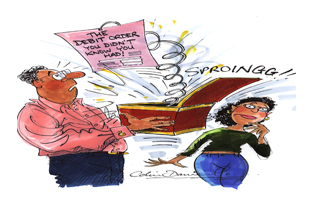
After approaching the Ombudsman’s Office, Ntombela’s problem was reported to the Home Affairs Deputy Director-General Vusi Mkhize, who made sure that her status was changed from “deceased” to “alive”.
The South African Social Security Agency subsequently reinstated her disability grant. Happy to be officially declared “alive”, Ntombela breathed a sigh of relief as this meant she would have an income again.
Heartfelt thanks
Mr Isaiah Dlamini and his business partner from Ndwedwe, north of Durban, also have praise for the Ombudsman’s Office. Dlamini, who is a furniture manufacturer, had been awarded an R1 million tender to supply furniture to the Gauteng Legislature.
Even though the furniture had been delivered to the Gauteng Legislature, he received no payment for the last batch of the order worth over R700 000. After all his attempts to resolve the problem failed, he approached the Ombudsman’s Office, which contacted the Chief Financial Officer of the Gauteng Legislature. The outstanding payment was released with the help of the Secretary of the Legislature.
An elated Dlamini went to the Office of the Ombudsman to express his heartfelt thanks for their assistance in person.
Oranges squash unemployment
Oranges squash unemployment sadmin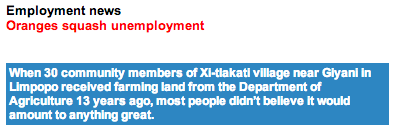
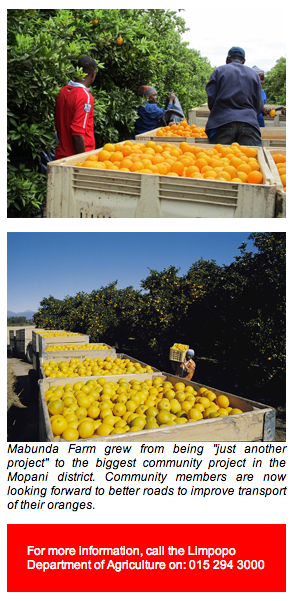
“It was just another project given to individuals – probably to grow some vegetables to sell and make a living from,” explains project manager Benet Malungani. However, with 10 hectares each, the community realised that they could start a successful farming business if they pulled their resources together. So they joined forces to form a 300-hectare citrus farm.
Today, the project called Mabunda Farm is the biggest community project in the Mopani district agricultural sector and employs more people in the surrounding villages than any other project. It boasts 60 permanent employees and more than 300 seasonal workers, many of whom had no income before.
Challenges
According to the village headman, Billy Nkuna, the project benefits the whole community. The Mabunda Royal Family earns R18 000 per season for renting the land, which is used to alleviate poverty in the village. “On top of that, it is also used to support schools in the area with computers and uniforms.”
Project manager Malungani agrees that the project is doing great things in the community. However, he says they can do even better, but some challenges are standing in their way. “We could double the employment number if it weren’t for the problems we have with storing and transporting our produce.”
He said several brokers decided not to work with them anymore because the poor roads had damaged their trucks.
Commercial road
Appealing to government to build them a tarred road, Malungani said, “We now depend on one broker who charges an exorbitant fee to transport our products to the market. Last year, we sold 256 packaging crates. If it weren’t for the gravel road, which squashes our oranges and weakens our market value, we could have made a bigger profit,” he said. Better roads will also help them to put plans in place to expand their business, he added.
Meanwhile, Mopani district mayor Joshua Matlou said he would appeal to the MEC for Roads and Transport to tar the road as a matter of urgency to make business activities more viable. “This is what we call a commercial road, and it’s very crucial that it’s tarred. I will therefore urge the MEC for Roads and Transport to consider it.”
-Collins Ndlovu
PE sports a comeback
PE sports a comeback sadmin
All of this, added to the pressing need in the country to identify and develop talented athletes, has led government to re-introduce Physical Education (PE) in schools. 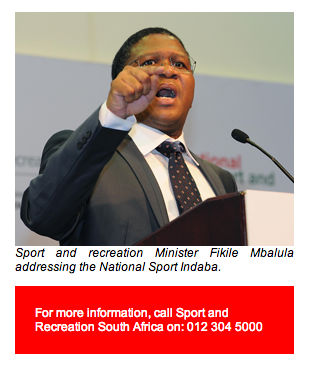
The Department of Sport and Recreation recently signed a Memorandum of Understanding with the Department of Basic Education to re-introduce PE in schools and the two departments announced a Schools Sport Programme partnership.
Government is also working with the private sector and sport federations to put more resources in school sports to identify talent and create a base from which to build future sport stars in different sporting codes.
At a National Sport Indaba held at Gallagher Convention Centre in Midrand in November last year (2011), the Minister of Sport and Recreation Fikile Mbalula said physical education would be practised in all schools resulting in school children broadening the talent pool.
Physical Education will be practised in all schools as a stand-alone compulsory subject and school sport will be compulsory on Wednesday afternoons and Saturday mornings.
School Sport Programme
Millions of rands will be pumped in the School Sport Programme. Funding will also be sought from the National Lotteries Board (NLB). Minister Mbalula said he would seek R100 million from the NLB to buy sports equipment and build infrastructure in all schools.
He said this would be fair as Lotto money came from parents who buy Lotto tickets, but have nothing to show for it.
The School Sports Programme will ensure that all primary and secondary schools in South Africa begin rolling out “Sport Wednesdays” when inter-schools activities would be held every week.
There will be provincial inter-school events and this will culminate in a first school sport Olympics.
The Minister added that within 10 to 20 years, the programme should put South Africa in the same competitive standing as Australia, the United Kingdom and the United States of America.
-Mbulelo Baloyi
Presidential Hotline: Hats off to the Hotline
Presidential Hotline: Hats off to the Hotline sadmin
It took Presidential Hotline staff just three days to resolve a problem that had dragged on for 18 months. Mr Andreatta of Edenvale in Gauteng had been wrongly penalised by the South African Revenue Services (SARS), who alleged that he did not submit his tax returns.
For almost a year and a half, Mr Andreatta tried to negotiate with SARS after they penalised him for failing to submit his tax returns when in fact he had done so.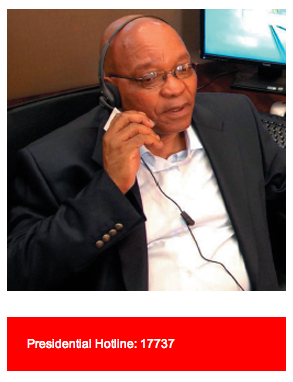
Deductions
To add insult to injury, SARS had proceeded to deduct R10 000 per month directly from his salary in December 2010, thus ruining his Christmas. The deductions continued in January and February 2011 for a total of R30 000 for penalties for non-submission of returns that have already been assessed.
However, Andreatta’s tax assessments had indicated that he was due for a tax refund of R20 000 and SARS ended up owing him more than R50 000 inclusive of the R30 000 in wrongly deducted penalties.
“I alerted SARS to the fact that I had been up to date with my tax return submissions and for 18 months they kept saying they were looking into the matter. I was promised a solution by many different people from SARS including a legal representative and a commissioner,” remarked Andreatta.
Sorted
As a last resort, he approached the Presidential Hotline for assistance.
“In three days, the problem I had been struggling with for 18 months had been resolved; SARS owned up and admitted that they were wrong. We are now trying to work out how much will be paid back to me,” said Andreatta.
In addition to his problem with SARS, the Presidential Hotline also helped Mr Andreatta to resolve an issue with the Department of Home Affairs.
-Mbulelo Baloyi
Rural development: Muyexe goes online with progress
Rural development: Muyexe goes online with progress sadmin
But as the rural development programme’s two-year term comes to an end, one wonders if it has achieved its aim of creating jobs and turning the village into a semi-township.
Some say Muyexe village is now blooming with residents having access to services never available to them before.
Semi-urban area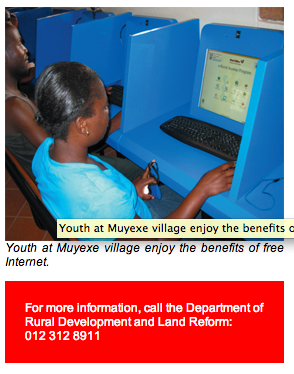
In 2009, the Minister of Rural Development and Land Reform, Gugile Nkwinti, introduced rural development projects in the village as part of the Comprehensive Rural Development Programme (CRDP). This brought about services mostly found in urban areas.
Thanks to developments such as libraries, clinics, a satellite police station, free Internet and many others, the village resembles a semi-urban area where residents enjoy an abundance of services at their fingertips. Improvements also include a post office with banking services.
“We have Internet facilities, a library and various other facilities such as a police station, a sports ground and many more which other villages don’t have,” said a clearly satisfied resident, Amukelani Baloyi.
Another resident, Tsakani Maluleke, received an RDP house and a free energy-generating solar device distributed free to houses without electricity. “I feel government has done enough already. By the time they install electricity in this area, we would have benefited twice, thanks to the solar systems,” she said.
Blooming
Meanwhile, the Mancena agricultural project is blooming after a boost from government. According to project manager Maria Ngoveni, Mancena has grown from a small non-commercial venture to a big enterprise that can produce a steady supply of various vegetables for sale in supermarkets such as Spar in Giyani.
When it comes to creating stable jobs, some people feel that government has not done enough yet, since most of the jobs created were temporary. “You can’t support your family with a three-month job that feeds your family today and leaves them hungry tomorrow,” said Portia Maluleke, a single mother of three.
According to a progress report by Louis Mabunda of Giyani Municipality released last year 2010, 535 jobs were created, most of them temporary. The report also revealed that only four people secured permanent employment from the project at the time of release.
Permanent jobs
However, new developments currently under construction are expected to create new permanent jobs. These include a sports centre and a fence circling the fields.
There’s also a water purifying project that will be coming in,” said Mabunda. He said the project had been expanded to include other villages in the Giyani area such as Gon’on’o and Dingamazi.
-Collins Ndlovu
Rural development: President ploughs back with rural development
Rural development: President ploughs back with rural development sadmin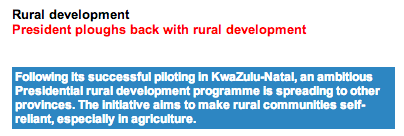
Early in 2011, President Jacob Zuma launched the Masibambisane Rural Development Initiative at his hometown of Inkandla, KwaZulu-Natal.
The programme was also implemented at nearby eShowe in the Umlalazi Municipality to create job opportunities for poor and vulnerable communities in rural areas.
The programme uses agriculture as a tool to help rural communities fight poverty and unemployment.
Since its launch, the programme has been extended to Mpumalanga’s Mkhondo Local Municipality in Piet Retief and the Eastern Cape’s Mhlontlo Local Municipality in Qumbu.
The rural development programme is chaired by President Zuma and various private sector organisations are also involved in the initiative as they provide inputs such as seeds and implements.
The national Department of Agriculture, Forestry and Fisheries and provincial departments of agriculture and rural development are also supporting the project with mechanisation in the form of tractors for vegetable and crop farming.
Creating jobs
Speaking at the launch of the Masibambisane Rural Development Initiative in Mpumalanga in November 2011, President Zuma urged emerging farmers to use their farms to help create jobs and alleviate poverty through agricultural projects.
“If you stand firm and make sure that these projects don’t fail in your hands, poverty can be alleviated and job creation can be high,” President Zuma said. “We need to wake up and do things ourselves. Government is here to help you. People must not rely on grants for a living when they have land.”
President Zuma was accompanied by Public Enterprises Minister Malusi Gigaba, Public Works Minister Thulas Nxesi and Mpumalanga Premier David Mabuza.
Build offices
Mabuza promised that offices of the Masibambisane Rural Development Initiative would be built in Mpumalanga soon.
“We have taken a resolution to build offices here in Mpumalanga, where Mpumalanga people can access them easily. We want people, including businessmen, to volunteer and boost projects in their communities. We don’t want the community to buy food from supermarkets, but let the supermarkets buy from them.”
Mabuza promised that his administration would support the Masibambisane farmers by buying food from them. “We will make sure that to sustain these projects, as government, we will buy food and vegetables for schools, hospitals and other government institutions. We will also help process them,” Mabuza said.
-Mbulelo Baloyi and Bua News
Rural development: Rising above the breadline
Rural development: Rising above the breadline sadmin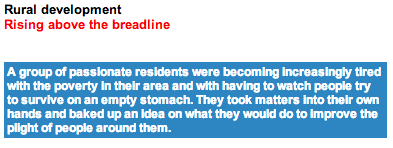
Many of the young children and the elderly in their community sometimes went days on end without a decent meal, but thanks to a group of women who decided to reach out to their community, they can now always count on having a meal every day.
The group of women form part of the Kgolagano Home-Based Care Group situated in the heart of Mokgalwaneng in the North West. Here they visit various ill and needy patients and children in the community and offer counselling services to patients with TB, HIV and AIDS. As part of helping others for Mandela Day last year, the women decided to bake bread for their patients, carrying out the baking in an old clinic.
The gesture was an instant success. Word soon got around and the women found themselves flooded with orders to bake more bread to meet the needs of the community.
According to chairperson of the group, Martha Mmamontiane: “The bakery project grew to our patient-feeding programme. During home visits to our patients, we found that most of them went through the day on an empty stomach, so we decided to bake bread to give to those who truly needed it.”
Once other residents in the community heard about the bakery, orders for bread came rolling in. “We got more and more orders every day,” said Mmamontiane. 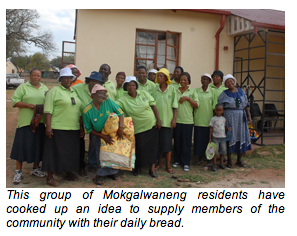
New premises
The project operated in the old Linchwe Clinic, given to them by the local traditional council, but the building soon became too small as the orders increased.
The group realised they needed a much bigger premises to bake more bread and to expand the project to catering as well. They group knocked on every door for assistance; spoke to various community leaders and approached their local municipality. Their prayers were eventually answered by the Department of Economic Development and Tourism who approved and funded a site to build a new, bigger premises for the project.
Today, their new premises is complete and a new and improved home-based care is in operation. The building is big enough to accommodate all the services they offer and will also allow them space to have more beds and fit in a relaxation area for patients.
Business spill-offs
According to community liaison officer, Rathotwana Matlou, the project not only created jobs, but also created business opportunities for three local tractor owners who were contracted to transport building material.
Portia Moeng, a local labourer on the project, said, “I’m grateful for the opportunity because I am now able to do things that I would otherwise only dream of. I am going to buy myself a new bedroom suite.”
-Samona Murugan
Safety & security: Beware of ATM thieves
Safety & security: Beware of ATM thieves sadmin
East London police spokesperson Lt-Col Mtati Tana said the recent arrest of a 33-year-old suspect was part of an ongoing investigation into the increase in reported ATM bank card thefts.
“The suspect was arrested by crime prevention after two cases were opened in a space of two days in the East London CBD. We believe he might be involved in other cases and urge anyone who has been the victim of a bank card theft to come forward,” said Tana.
Lonwabo Nkonki, who witnessed a robbery in the East London CBD, said he saw a well-dressed man pretending to help a pensioner withdraw money. Minutes later the man disappeared and the pensioner was left holding a fake bank card.
“I never thought he could be a conman. He was dressed formally and looked very respectable,” said Nkonki.
Tana said the ATM card thieves pretend to help the victim, quickly swap their card with a fake one and disappear after the victim has typed in his or her PIN code.
“This happened to a 77-year-old man who reported a case of fraud on Wednesday. The thief then went on a R3 000 shopping spree in town, buying goods from different shops,” said Tana.
He said police arrested the 33-year-old man in connection with the case and he appeared in the East London magistrate’s court on charges of theft.
Justmoney.co.za advises people using ATMs to follow a few simple guidelines:
- make sure your PIN is something that is not obvious
- memorise your PIN, do not write it down
- If you spot any suspicious looking characters nearby, leave or approach security
- if the ATM is giving you trouble or you feel that it is not working like it should, cancel your transaction immediately and try another ATM
- make sure nobody is watching you put in your PIN on the keypad
- If you need help, do not ask strangers or security guards for help. Ask a bank official. If your card is stuck, do not accept help from strangers
- if it looks like the card slot has been tampered with, do not use the ATM
- make sure you get your card back whenever you are done with a transaction. Make sure it’s your card with your details and somebody hasn’t swapped your card.
- if your card is lost, stolen or jammed into a machine, make sure you contact your bank immediately.
-BuaNews
Safety & security: Going beyond the call of duty
Safety & security: Going beyond the call of duty sadmin
When they’e not stopping crime and arresting criminals, many police officers are busy making a meaningful contribution to their communities.
Every year, the South African Police Services (SAPS) recognises and rewards these bright stars. This year was no exception.
Under the theme “Our brightest stars, going beyond the call of duty”, 10 women from SAPS were honoured at a glittering function at Sun City, in the North West.
The Deputy Minister of Police, Ms M Sotyu; Acting National Commissioner of the SAPS, Lt Gen Nhlanha Mkwanazi and several divisional commissioners and provincial commissioners, as well as representatives from Microsoft SA, Assupol Life, Massmart, Business Against Crime and SARPCCO, attended the event.
Lt Gen Mkwanazi was quick to point out that the awards were not necessarily about drawing comparisons between the initiatives of the finalists, but rather about how they complement each other as they embrace and advance the SAPS agenda against crime.
Underprivileged children 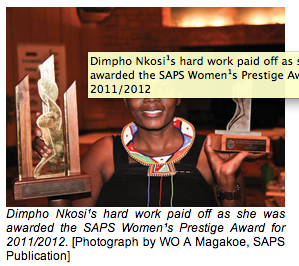
However, there must be a winner and this year the brightest star of all was Dimpho Nkosi, who stood out as a result of her efforts to light up the lives of many destitute families and underprivileged children.
Aptly, Dimpho announced that coinciding with her relocation to the Mpumalanga provincial Head Office in 2008, her son Banisiwe was born. This motivated her to never allow a moment to pass by without planning how she would raise him in a comfortable and loving environment. She recalls: “I challenged myself even more after realising I had the responsibility of being a mother, not only to him, but also to other children.”
Christmas
As she went about buying Christmas gifts for her son, she couldn’t help but be reminded of all the many destitute children who were orphaned and had no one to spoil them. “This drove me to gather information on orphanages around Nelspruit and allowed me to identify children from John Mdluli Primary School, who were living under very difficult circumstances. Once I met these children, I fell in love with them and I was even more determined to arrange something for them that Christmas,” she recalls.
“I collected pledges from colleagues and friends and invited sponsors to come on board. Eventually I secured an event which provided the orphaned children with the best treat of their lives. They were driven around in a Porche Cayenne and a Ferrari, and they took home food parcels and Christmas gifts. That day was one of the happiest days of my life, a day I will never forget.”
Passion for children
In 2009, Dimpho was introduced to the SAPS Women’s Network, which made it easier for her to further explore her passion for children. “I then established working relationships with stakeholders involved in uplifting communities - organisations such as the Moral Regeneration Movement, Child Line, Child Welfare, The Office of a Child’s Rights in the Premiers office, Social Development and Health. These partnerships allowed me to better understand the concerns relating to our children in communities, and have insight into the plans of other department to address such concerns”.
She went on to remind us why she was such a worthy winner. “I have worked in a number of disadvantaged areas such as Msholozi, Pienaar, Dantjie, Matsafeni, Likazi, Witbank, Tweefontein , Matsulu and Msogwaba where I have fed and clothed families. I have adopted the Msholozi Orphanage and the Good Hope Centre in Nelspruit. For months I collected food, water and clothing, all of which were handed over to The Gift of the Givers to ship through to the people in the troubled Somalia.”
A worthy winner indeed!
-Lt Col E Holtzhausen
Safety & security: National Police Day – honouring our men and women in blue
Safety & security: National Police Day – honouring our men and women in blue sadmin
“We are under no illusion that there are quick fix solutions to policing challenges in South Africa. We do believe that over the last two years we have begun to put in place processes that are not only yielding some successes, but will also become the building blocks for the Police Service we envisage,” he said.
Against this background, National Police Day is celebrated on 27 January each year to signify the anniversary of the establishment of the South African Police Service (SAPS) in January 1995.
With this day, government gives recognition to the service rendered by the police and honours those who have paid with their lives to protect and serve the people of South Africa.
National Police Day also indicates to local and international communities that the SAPS is honoured and respected for the law and order and the safety and security it provides for South Africa and its people. It shows that the SAPS has the full support of government.
Safety & security: What is Crime Stop?
Safety & security: What is Crime Stop? sadmin
When phoning 08600 10111, members of the public are assisted by trained interviewing specialists to pass on information about criminal activity to the South African Police Service in a safe, non-threatening environment. 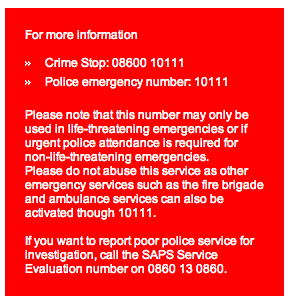
Crime Stop has enjoyed great success since 1994, solving more than a quarter of a million criminal cases and recovering more than
R1 billion in stolen property and drugs.
You can phone Crime Stop if you have any information about crime or suspicious activities, or if you think you have information that may prevent a crime or help the police investigate a crime which has already taken place.
The Crime Stop call centre operates 24 hours a day, seven days a week.
When you call, an interviewer will take down the details, and ask for as much information as you can remember about the crime, or suspicious incident. Callers are given a unique code number, which must be remembered.
Callers can remain anonymous if they choose and therefore need not fear involvement or retaliation. This is vital to the success of Crime Stop.
Calls are not traced, and your number is not visible to the call centre. Your unique code allows you to call back at a later time if you remember something further, or want to enquire about the case.
School fees: who is automatically exempt?
School fees: who is automatically exempt? sadmin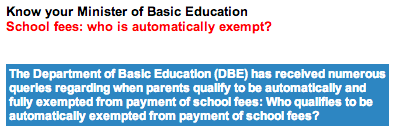
1. Persons who have the responsibility of a parent with respect to a child placed in: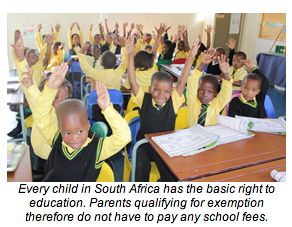
- a foster home
- a youth care centre
- a place of safety
- an orphanage.
2. A person who is a caregiver of an orphan or a child who has been abandoned by his or her parents and is without any visible means of support.
3. A person who receives a social grant (such as a child support grant and care dependency grant) on behalf of a child.
4. A child who heads a household.
What should a parent do to be granted automatic exemption?
1. Parents must obtain one of the following documents:
(i) a sworn statement or affidavit confirmed by the South African Police Service, a social worker or other competent authority, or
(ii) a court order.
2. The document must be handed to the principal of the school or a member of the governing body.
Parents qualifying for full exemption are not required to pay any school fees.
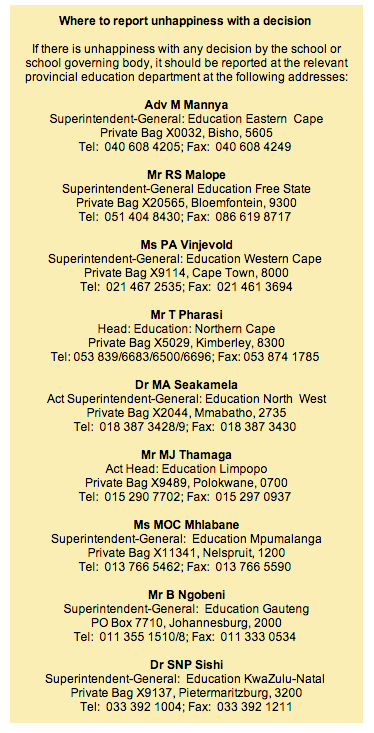
Securing international peace and security
Securing international peace and security sadmin
This is the second time that South Africa has served on the Security Council following its first term from 2007 to 2008.
South Africa’s present non-permanent membership of the UNSC followed its election in October 2010.
International Relations and Cooperation Minister Maite Nkoana-Mashabane emphasised South African’s position when she said, “In its actions, South Africa is guided by the commitment to uphold international law and universal values and to help others protect or achieve their inherent and inalienable rights.”
As a member of the Security Council, South Africa was a mediator in global conflicts. In Libya, President Jacob Zuma mediated between the warring parties on more than two occasions.
Peace-keeping missions
As South Africa enters its second year as a non-permanent member of the UNSC, it is important to note that we have been consistent in making a contribution to the work of the Council in the maintenance of international peace and security, especially in Africa.
During its membership of the UNSC, South Africa saw the birth of a new a country in July 2011 when the Republic of South Sudan joined the African Union and the UN as a fully-fledged member nation.
South Africa continues to support UN and AU peace-keeping missions in the Democratic Republic of the Congo, Sudan and Burundi. In addition, it continues to facilitate talks between parties in neighbouring Zimbabwe to make sure that the aims of the Global Political Agreement signed by the Movement for Democratic Change and the Zimbabwe African National Union are realised.
Recently, the UNSC took a decision, supported by South Africa, to place additional sanctions on Eritrea “for continuing to provide support to armed groups seeking to destabilise Somalia and other parts of the Horn of Africa”, building on the arms and travel blockades it imposed exactly two years ago.
Continued efforts
South Africa will, in its second year as a UNSC non-permanent member continue its efforts to promote and enhance the Security Council’s cooperation with regional organisations. This will apply particularly to the African Union’s Peace and Security Council of which South Africa is a member.
-Mbulelo Baloyi
Sink or swim?
Sink or swim? sadmin
n 2002, at the age of 11, Emily’s left leg was amputated as a result of osteosarcoma – that is cancer of the femur.
Chemotherapy had failed to reduce the cancer, so she had to make a life-changing decision, to either lose her leg or lose her life! After losing her leg, the outgoing and sport loving girl who loved surfing, backpacking, running middle distance races and hiking felt like her life had come to a grinding halt.
Her supportive family, together with members of the community, introduced her to the Mandeville Sports Club to make sure she got back her positive sporting outlook on life.
This was where she discovered her new passion: swimming.
Paralympic team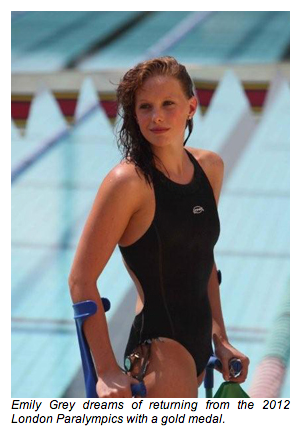
At Mandeville, Emily says swimming gave her a sense of freedom in the water. With the help of excellent coaches, hard training and great role models like Natalie du Toit, it took only a few years of swimming before Emily was recognised and selected to be a part of Team South Africa at the 2008 Paralympics in Beijing.
So far, Emily has completed the annual Nedbank National Championship and broken national backstroke swimming records, as well as represented South Africa in England, Brazil, Holland, Australia and Taiwan.
She says her best achievement to date is finishing 4th in the 400-m freestyle race in the 2010 International Paralympic Championship in Holland where she competed against top international female swimmers.
University colours
Emily’s next goal is not only to qualify to participate in the 2012 London Paralympics but to return with a gold medal or two.
Emily is currently a student at the University of Pretoria and was awarded her university colours for swimming last year (2011). She is studying towards a degree in Sports Science and hopes to complete her degree with business studies.
Despite her disability, Emily still lives a full life and accepts any challenge that comes her way. As a result of Emily’s achievements and positive attitude, she was appointed by Nedbank through the South African Sports Association for the Physically Disabled to be their brand ambassador where she visits schools across the country to motivate young people.
With all your heart
Emily has a positive outlook and believes that if you do something you should do it with all your heart. She describes herself as a quiet and determined person with a view that you need to get on with life and appreciate all the things you have, rather than what you don’t have.
Her philosophy is that “Whatever you may do in life, do it to the best of your potential and you will never be disappointed with yourself”.
-Source: This Ability magazine
Soldiers, we salute you!
Soldiers, we salute you! sadmin
South Africa played a supporting role by helping transport ballot papers from our country, where they were printed, to the various voting stations in all corners of the large West African country.
The DRC’s Independent Electoral Commission had requested the help of the South African National Defence Force (SANDF) with military planners, additional helicopters and other infrastructure to ensure that ballot papers were distributed to 63 865 voting stations, working with the DRC Defence force.
Up to the challenge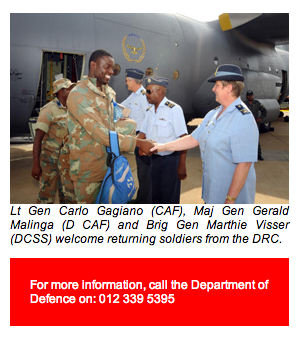
Chief of Joint Operations Lt General Derrick Mgwebi said while the process was not an easy one, the SANDF had been up to the challenge.
General Mgwebi said the ballot papers were initially meant to be delivered to 13 points in the DRC, but the number was increased to 210 hubs at quite short notice. From the 210 hubs, the ballot papers were distributed to the voting stations.
With a fleet of about 30 military aircraft, General Mgwebi’s team managed to deliver all the ballot papers to all the voting stations, with help from the United Nations.
Asked how he felt about the exercise, the General simply said: “We had to assist when called. It was a satisfying experience.”
Proud
The team from the South African Air Force also assisted given their experience in assisting a country in its elections.
Colonel Mzayifani Innocent Buthelezi, Senior Operations Officer from South African Air Force Command (SAAF) Post, said the SAAF had deployed more than 30 members. He said there had been challenges in getting flight clearances as aircraft flew over the airspace of neighbouring African countries.
The SANDF soldiers returned to Air Force Base Waterkloof in December 2011.
Defence Minister Lindiwe Sisulu said South Africans must be proud that the Defence Force was contributing to building and strengthening democracy in the continent.
“To the Chief of the SANDF, and all our soldiers deployed in the Congo, we are proud of you, and the people of Congo will never forget the role you played in this important election,” she said.
Peace
The African Union and the Southern African Development Community declared the elections free and fair. The SADC Election Observer Mission had deployed 198 observers in 10 provinces.
In his capacity as the Chairperson of the SADC Organ on Politics, Defence and Security Cooperation, President Jacob Zuma congratulated the people of the DRC.
He said they had shown determination to consolidate peace, enhance national reconciliation, boost the democratic process and lay the foundation for lasting peace as well as economic and social development. He impressed upon them the need for sound leadership and unity going forward. It was the second democratic presidential election since the country attained its independence in 1960.
-Edwin Tshivhidzo
Surviving festivities: DJ Zinhle's responsibility mix
Surviving festivities: DJ Zinhle's responsibility mix sadmin
For some, the festive season was a wake-up call to be more cautious in future of excesses like drinking too much, driving under the influence of alcohol, unsafe sex an overspending.

Someone who has been observing people’s party behaviour and witnessed first-hand how people lose their sense of responsibility at parties, is DJ Zinhle.
Zinhle Jiyane, aka DJ Zinhle, stepped onto the South African DJ scene at a time when it was still very much a man’s world.
But this talented young woman quickly turned heads with her crazy skills on the turntables.
She even grabbed the attention of some of Mzansi’s most respected DJs, such as Oskido, on the way to becoming one of the best female house DJs in South Africa.
Vuk’uzenzele picked up some safe partying tips from a woman who knows how to make a party.
DJ Zinhle suggests:
The do’s:
- Always let someone know where you are going and whom you are with when you go out at night.
- Have a party budget, so that you don’t end up overspending.
- Choose a designated driver who will not drink and drive.
- Take a condom if you think you are going to be intimate and use it when the time comes.
- Keep your cellphone with you in case you need to make an emergency call.
The don’ts:
- Don’t drink anything anyone offers you, especially if it’s already open.
- Never leave a party with a stranger, especially if you have been drinking.
- Don’t drive if you have been drinking, rather take a taxi to the venue and back if you plan to drink.
- Don’t use your cellphone while driving, except if it’s an emergency call.
- Lock all your car doors when driving, especially at night.
- Abstain from sex with strangers, especially if you have been drinking, as alcohol weakens your sense of responsibility.
- Don’t experiment with drugs.
- If you are under-age don’t go to places that have an age restriction.
What to carry when going out:
- Always have extra cash for emergencies.
- Always carry pepper spray as a safety precaution.
- Have your driver’s licence with you if you are driving.
- Have your ID with you.
What to avoid:
- Avoid going to places you have never been to with someone you have just met.
- Avoid travelling alone at night.
- If you have to travel alone, make sure you have enough petrol and that your car is roadworthy.
Save for a rainy day
Ok, so there you have it folks.
Remember, too much of anything is not good and that alcohol and drugs make you do irresponsible things.
Keep in mind to not spend more than you can afford; save some money for necessities to kickstart the New Year.
Make sure that you have enough saved up for school uniforms, stationery, travelling expenses and so on. Have fun!
-Refilwe Thobega
The chilling realities of climate change
The chilling realities of climate change sadmin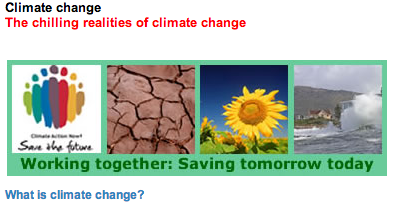

The earth’s climate is always changing and several centuries ago the causes of this change would have been primarily natural in origin. Apart from increasing average temperature, climate change also includes changes in rainfall patterns and in extreme weather events that lead to things like floods and droughts.
Nowadays, although natural changes in the climate continue to occur, the term ‘climate change’ is generally used when referring to changes in climate which have been identified since the early part of the 1900s.
Many of the causes of these changes are related to humanity’s emissions of greenhouse gases.
Rising levels of greenhouse gases, such as carbon dioxide, are already changing the climate and are expected to continue to do so throughout the 21st century and beyond. However, there are many uncertainties about the scale and impacts of climate change – particularly at the regional level.
What is certain, however, is that climate change is likely to have a significant impact on the global environment through increases in temperature; increases in sea level; changes in levels and patterns of precipitation such as rainfall, snow and sleet; and changes in the severity and frequency of extreme weather conditions such as droughts and floods.


What is causing climate change?
- An increase in the atmospheric concentrations of gases known as greenhouse gases, is a major cause for the steady rise in average global temperatures.
- Greenhouse gases are released into the atmosphere when we burn fossil fuels like coal, oil, petrol, diesel and natural gases.
- Human activities, such as chopping down forests (deforestation), also reduce the earth's natural ability to absorb greenhouse gases.
Some facts about climate change:
The impact of climate change is already felt by both people and the environment throughout the world.
Numerous changes resulting from climate change have already been observed:
- measured increases in the average global temperature
- measured rises in the average global sea level
- reduced snow cover in the northern hemisphere
- significantly increased rainfall in eastern parts of North and South America, as well as northern Europe and northern and central Asia
- the frequency of heavy rainfall events has increased over most land areas - consistent with warming and increases of atmospheric water vapour
- drying in the Sahel, the Mediterranean, southern Africa and parts of southern
- Asia
- more intense and longer droughts observed since the 1970s, particularly in the tropics and sub-tropics
- widespread changes in extreme temperatures have been observed
- cold days, cold nights and less frequent frost
- hot days, hot nights, and more frequent heatwaves.
Why should I worry about climate change?
If we do nothing, then by 2100, we can expect the following consequences:
- Coastal regions will experience a rise in temperature of between 3 ° C and 4 ° C.
- The interior will experience a rise in temperature between 6° C and 7° C.
- Climate change will have a serious impact on biodiversity, which is the variety of life around us - from the largest animal to the smallest plant.
- Commercial forestry is vulnerable because of increased frequency of wildfires and decreasing availability of water in many areas.
- Increase in diseases such as cholera, which are associated with extreme weather events.
- There will be more extreme weather events such as flooding, storms and drought.
Why should we be worried about climate change?
- Many South Africans are vulnerable to extreme climate conditions because of poverty, disease and poor housing and living conditions.

- In many areas, South Africa already has low and unreliable rainfall.
- Most of our surface water resources are already fully allocated.
What is Government doing?
South Africa’s Climate Change Response Policy will embody Government’s commitment to:
- a fair contribution to stabilising global greenhouse gas concentrations in the atmosphere
- protecting the country and its people from the impacts of unavoidable climate change
- presenting government’s vision for an effective climate change response and the long-term transition to a climate-resilient and low-carbon economy and society
- a vision based on government’s commitment to sustainable development and a better life for all.
A climate-resilient, low-carbon economy and society must:
- build up resilience to resist the effects of climate change
- reduce greenhouse gases.
In the long-term, the goal is to transform the economy by shifting from an energy-intensive path to a climate-friendly path as part of a pro-growth, pro-development and pro-jobs strategy.
What can I do about
Climate change?
We can’t stop climate change on our own, but all of us can make a contribution by changing the way we live. We can all play a part in lessening human impact on climate and reversing the effects of climate change:
- Plant indigenous trees
- trees absorb carbon dioxide from the air and use it as their energy source, producing oxygen for us to breathe.
- Recycle
- recycling plastic, glass and paper products. Recycling paper saves trees and reduces the energy used in paper manufacturing.
- Save water
- don’t use more water than you really need
- don’t let water run while shaving, brushing teeth or washing vegetables,
- fix leaking taps
- shower rather than bath.
Save electricity
There are many ways to save energy in our daily lives. The following is a short list of things we can do.
- unplug or turn off all electronic equipment when not in use, including lights, TVs, heaters, fans and kitchen appliances
- select the most energy-efficient appliances.
- install a solar water heater
- use gas for cooking
- insulate your house
- use less hot water; wash your laundry in cold or warm, instead of hot water
- set your geyser’s thermostat on between 50 °C 60 °C
- dry clothes on a washing line instead of using a tumble dryer
- Switch to energy-saving light bulbs. Replace all your old light bulbs with energy-saving compact fluorescent light bulbs. This can save up to 80 per cent on your next electricity bill and lasts up to eight times longer.
Change the way you travel
- use your car less frequently; rather use public transport, walk, jog or cycle if you can
- ensure that your car is in good running order
- maintain proper tyre pressure to maximise your vehicle’s petrol consumption
- when you buy a car, choose an energy-efficient one to reduce you petrol consumption and emissions.
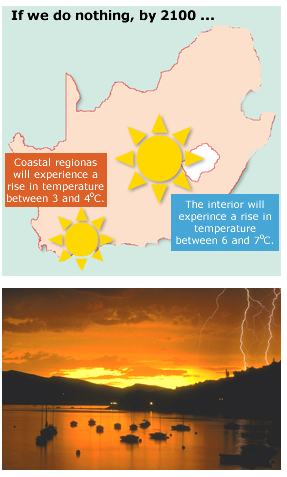
- join a lift club.
Why do we need an international agreement?
No country can combat climate change on its own; the whole world needs to work together to make their fair contribution to mitigation efforts. South Africa’s greenhouse emissions are a small fraction of the global emissions – In 2005, it was only 0,98 per cent of global emissions. If South Africa reduced its emissions by 20 per cent and China and the USA increased their emissions by 0,6 per cent, global emissions would remain the same.
So even if South Africa does everything in its power to reduce its greenhouse gas emissions to zero, but the rest of the world carries on regardless, South Africa will still experience the full impacts of climate change.
The South African government will continue to engage actively and meaningfully in international climate change negotiations, specifically the United Nations Framework Convention on Climate Change (UNFCCC) negotiations.
This will help us to secure a binding, multi-lateral international agreement that will effectively limit the average global temperature increase to at least below 2°C above pre-industrial levels. South Africa’s international engagement with the UNFCCC process.
Article 3.1 of the UNFCCC states that “Parties should protect the climate system for the benefit of present and future generations of humankind, on the basis of equity and in accordance with their common, but differentiated responsibilities and respective capabilities…” Articles 3 and 4 compel parties to take actions to mitigate climate change.
-Source: Department of Environmental Affairs
What is the greenhouse effect?
The temperature of the Earth is determined by the balance of energy coming in from the sun in the form of visible radiation (sunlight) and energy being lost from the surface of the Earth to space.
Energy coming from the sun passes through the atmosphere and warms the Earth – but the emitted infra-red radiation coming from the Earth’s surface is partly absorbed by gases in the atmosphere and some of it is re-emitted downwards, further warming the surface of the Earth and the lower levels of the atmosphere.
This effect has been called the greenhouse effect because of a similar effect caused by glass in a greenhouse: it lets sunlight into the greenhouse but in turn traps a portion of infra-red radiation (heat) inside the greenhouse.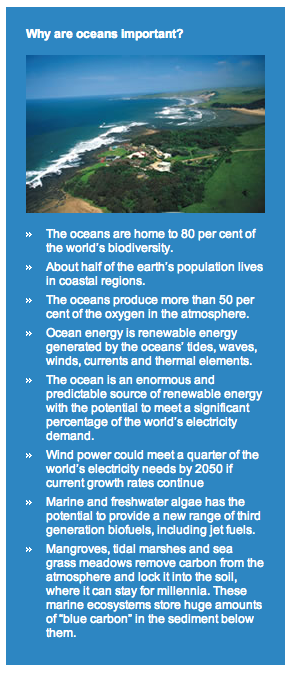
The change in balance between radiation coming into the atmosphere and radiation going out is known as radiative forcing. A positive radiative forcing tends on average to warm the surface of the earth; negative forcing tends on average to cool the surface.
Greenhouse gases
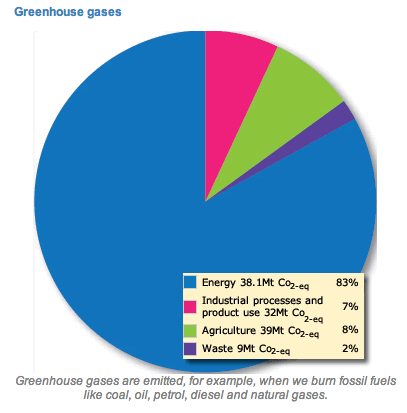
The most important greenhouse gases in the atmosphere (in terms of this effect) are: carbon dioxide, methane, nitrous oxide, hydrofluorocarbons, perflurocarbons and sulphur hexafluoride.
Carbon dioxide: this is the most important of the greenhouse gases released by human activities. It is the main contributor to climate change because of the quantities released, especially through the burning of fossil fuels.
When fossil fuels are burned, the carbon content is oxidised and released as carbon dioxide. Every tonne of carbon burned produces 3,7 tonnes of CO2. The global consumption of fossil fuels is estimated to release 22 billion tonnes of CO2 into the atmosphere every year –and the amounts are still climbing.Department of Environmental Aff
Thuli wins with FAIS
Thuli wins with FAIS sadmin
She decided to buy the goods on hire purchase since she didn’t have enough cash. The total value of the goods was R3 004,88. She was asked to sign many documents for her purchases and when she finally left the store, she found 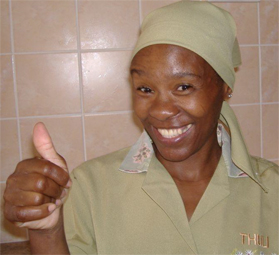 that she owed them R6 468,89. At home she unpacked all the paperwork with the help of her employer Mrs Van Zyl who discovered that she was also sold a credit life policy, a warranty and a goods insurance policy and she was charged contract fees.
that she owed them R6 468,89. At home she unpacked all the paperwork with the help of her employer Mrs Van Zyl who discovered that she was also sold a credit life policy, a warranty and a goods insurance policy and she was charged contract fees.
With the help of her employer, Gumede lodged a complaint with the FAIS Ombud. In his determination, the then FAIS Ombud, Charles Pillai, found a number of shortcomings in Barnetts’ dealings with Gumede. The first was that the Terms and Conditions a three-page document was not present when Gumede signed the Schedule to the Loan Agreement. Pillai noted that on Gumede’s version of the documents the agreement was incomplete at point of sale.
There were also serious mistakes with a number of the documents Gumede signed. The Extended Guarantee Contract was not properly completed with important fields left blank. The Ombud found the Extended Guarantee Contract invalid. It was found that Gumede was also charged a R348 60 delivery charge when she had collected the goods from the store herself. Gumede won the case and the money was refunded to her.
Wage increase a relief for domestic workers
Wage increase a relief for domestic workers sadmin
“I am so excited about the increase, it is not that much but it will make a difference. At least I will be able to buy school uniforms in January,” said Sarah Nkomo, a domestic worker in Mbombela. Precious Nkosi, a contract cleaner at the Mbombela local municipality, urged the Labour Department to do inspections because some employers normally don’t comply with wage increases.
“It will be a relief to most of us because food is very expensive these days, but labour inspectors must make sure that this becomes a reality because some of our colleagues don’t get any wage increase,” said Nkosi.
Labour Minister Mildred Oliphant announced the increase for domestic workers as part of an annual binding determination in line with the Basic Conditions of Employment Act.
Geographic areas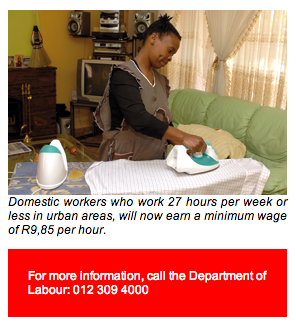
Domestic workers who work 27 ordinary hours per week or less in urban areas will now earn R9,85 per hour, which is an increase from R9,12 per hour.
The weekly rate will increase from R246,30 per week to R265,94 while the monthly rate will increase from R1 067.15 to R1 152,32 per month.
Domestic workers in rural areas will now earn R7,06 per hour instead of R6,44 per hour. The weekly rate will increase from R290 to R317.62, while the monthly rate will increase from R1 256,14 to R1 376,25.
Contract cleaning
Contract cleaning sector employees’ wages in rural municipalities will increase from R11,27 per hour to R 12,23 per hour. In urban municipalities, they will earn R13,51 per hour instead of R12,51.
Oliphant said the determination not only set the minimum working hours and minimum wages, but also a number of leave days and termination rules.
Employers
“Domestic employers who choose to ignore this Domestic Worker Sector determination and disregard the law must know that the department will be watching vigilantly,” warned Oliphant.
“Employees are encouraged to report non-compliance at their nearest Labour Centres. The department will intensify enforcement of law during its routine and blitz inspections.”
-BuaNews
We want to earn our money
We want to earn our money sadmin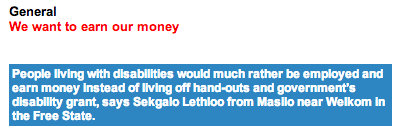
Lethloo, a 38-year-old father of two young boys, who attended the International Day of People with Disabilities event in Bloemfontein at the end of 2011, said he wanted nothing more than a job.
He uses a wheelchair to get around but said given a chance, he can do anything with his hands.
Do things for ourselves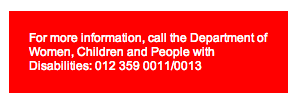
Lethloo is also the chairperson of the Disabled People of South Africa in Masilo. He said his in organisation, they encouraged one another to do things for themselves, including starting their own businesses.
“I do not like it when people feel pity for me, giving me hand-outs as if I cannot work. Being disabled does not mean that one cannot work or do things for himself. We want to be recognised and be offered jobs – that’s what we want,” he said spiritedly.
Asked what he would like to see government doing for people with disabilities, he said funds must be set aside for job creation for people with disabilities.
“We want jobs, we want to earn our money.”
Part of society
Chairperson of the South African Disability Alliance, Muzi Nkosi, said most people with disabilities were poor because they were unemployed.
He called on government and the private sector to employ people with disabilities so they could lead a normal life without burdening other people.
Echoing Nkosi’s sentiments was Dikeledi Shupinyaneng from Thaba Nchu, a member of the Association of People with Disability. She emphasised that government and the private sector should provide jobs for people with disabilities.
Shupinyaneng also expressed concern about being unable to access some government and municipal buildings, saying this made them feel they were outcasts.
“We just want government to recognise and listen to us. This will make us feel we are part of society.”
Employment target
Failure to achieve the 2 per cent target set for the employment of people with disabilities goes against the Constitution, says Women, Children and People with Disabilities Minister Lulu Xingwana.
Speaking in Bloemfontein to commemorate International Day of People with Disabilities, the Minister urged employers to work vigorously to achieve the target. She said South Africa had only achieved a 1 per cent employment rate for people with disabilities, but was hopeful the target would be reached this year.
The minister encouraged all disabled job-seekers to register with the Department of Labour and with employment agencies. She called on the private sector to actively get involved in employing people with disabilities.
-Edwin Tshivhidzo
Writing a winning CV
Writing a winning CV sadmin
However, before you will even be invited for an interview, your prospective employer will want to see your CV.
What is a CV?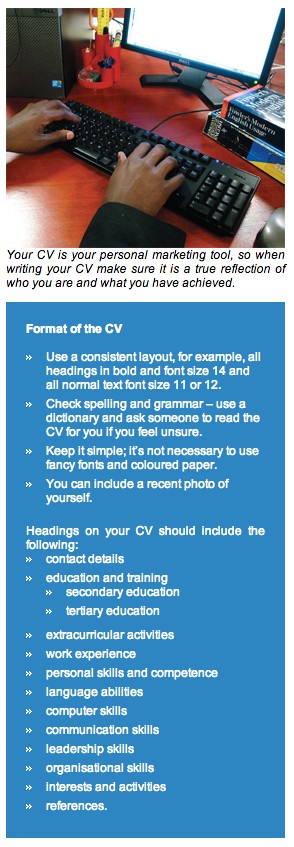
The term CV is short for the Latin words “curriculum vitae” meaning “course of life” – in other words a summary of your work experience, educational background, and skills. A CV should be short, to the point and easy to read, but should contain all the important information about your education and work experience.
A good CV is not just a standard template that you use to apply for any position, but it should be adapted to match each position that you apply for.
Your CV is your personal marketing tool that will secure you an interview – not a job. The more effort you put into this marketing tool, the better your chances that your CV will reflect the “true you” and the better your chances of being invited to an interview.
Why a CV?
CVs are used by recruiters to screen applicants and to compile a short list of candidates for an interview. It could also be used to identify the strengths of different applicants. Never lie on your CV– if you are appointed and it is established that you were not honest about qualifications and/or skills, you could be dismissed.
Application letter
When applying for a job, a covering letter or application letter must accompany your CV. The letter should state that you wish to apply for the job as advertised and briefly say why you think you are the right person for the job.
What should your CV include?
Your CV should focus on your qualifications, experience, achievements and accomplishments. You should illustrate how you are different from other applicants with the same qualifications as yourself and how you will add value to the organisation. You can also mention hobbies and interests, especially if they relate to the job you are applying for.
In short:
- Your CV should be a true reflection of who you are what you have achieved and what experience you have gained to date.
- Your CV should include a concise list of your personal information including your name and surname, your permanent address, your contact numbers and your e-mail address.
- Your CV should not hastily put together a day before you need to submit it – crafting a CV should be a carefully considered process that takes time.
- Make sure there are no spelling or grammar errors. When you have completed your CV, ask someone you trust to read it carefully.
- You must include a list of references, which are people who can be contacted to verify facts on your CV.
The following tips on writing a CV supplied by UNISA Online (www.unisa.ac.za), is an excellent guide for first-time CV writers:
Before you start
- Why am I compiling this CV? Your aim is to introduce yourself in the most effective way to a prospective employer. Mainly, you will highlight your strengths and accomplishments. You will therefore need to do a careful analysis of your skills and provide examples of your accomplishments.
- How can I target my CV? Put yourself in the shoes of the recruiter. What kind of skills and experience and qualifications are needed for this job? What is the culture of the organisation? Am I addressing all the requirements for the job in my CV (if you are responding to an advertisement)?
- What should I include in my CV? Your CV should present evidence of your life experience in a positive way. Do not simply list all your work and educational experiences – demonstrate clearly what you have achieved and the skills you have developed. Maintain a balance between too much information (this will bore the reader) and too little information (this will not do your skills justice).
- How should I present my CV? Think about your layout, the paper you want to use, and whether you will be submitting this CV on-line or in person. What kind of CV is needed – a 1-page or 2-page CV, or an extended CV with more detail about my skills?
-Louise van Niekerk
Youth tap into business opportunities
Youth tap into business opportunities sadmin
The training was an initiative of the National Skills Fund and auditing firm Deloitte. Driving government’s key priority of job creation, the Government Communication and Information System (GCIS), in partnership with auditing firm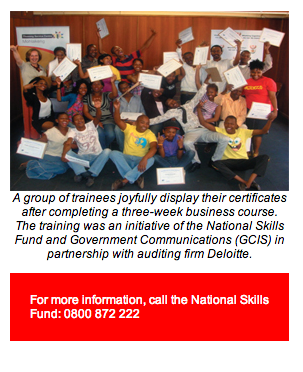 Deloitte, hosted a three-week training programme targeting unemployed youth in Randfontein, Gauteng.
Deloitte, hosted a three-week training programme targeting unemployed youth in Randfontein, Gauteng.
The training sessions were held at the Mohlakeng Thusong Service Centre. GCIS, with assistance from Randfontein community development workers, identified and submitted a list of unemployed youth to Deloitte to be part of the training.
Selection
One of the criteria for participation in the programme was that it was open only to youth who had not yet benefitted from any of government’s development initiatives.
Candidates who were selected underwent a gruelling interview with Deloitte to determine their suitability for the training. From the 63 names submitted for interviews, only 20 participated in the training.
Topics covered included Business Management, Business Development (incorporating Project Management and Time Management), Business Development Tendering, Communication Skills, Customer Care, Financial Management, Financial Life Skills, Human Resource Management and how to manage HIV and AIDS in the Workplace.
The objective of the training was to teach and encourage youth who are interested in opening their own businesses, about opportunities they can tap into to make their lives better.
Cooperatives
One of the successes of this project is that youth who attended the training, have decided to work together and form cooperatives where they will use all the information and skills learned during the training.
Speaking about what she has gained from the workshop, Beureldine Hendryhett, said, “I’m now an owner of a small business in Toekomsrust and I’ve learned to appreciate the people I work with. Good customer service is one thing that I will practise all the time as I have realised that without customers, I can never hope to make a profit in my business.”
Another participant, Themba Matshidiso said, “One thing I have taken from the workshop is that I have discovered that planning in business is very important. My level of thinking has changed drastically. Where once I believed that I had to wait for things to happen, I now look for opportunities I can use to make me successful in business.”
-Matshidiso Mokoka